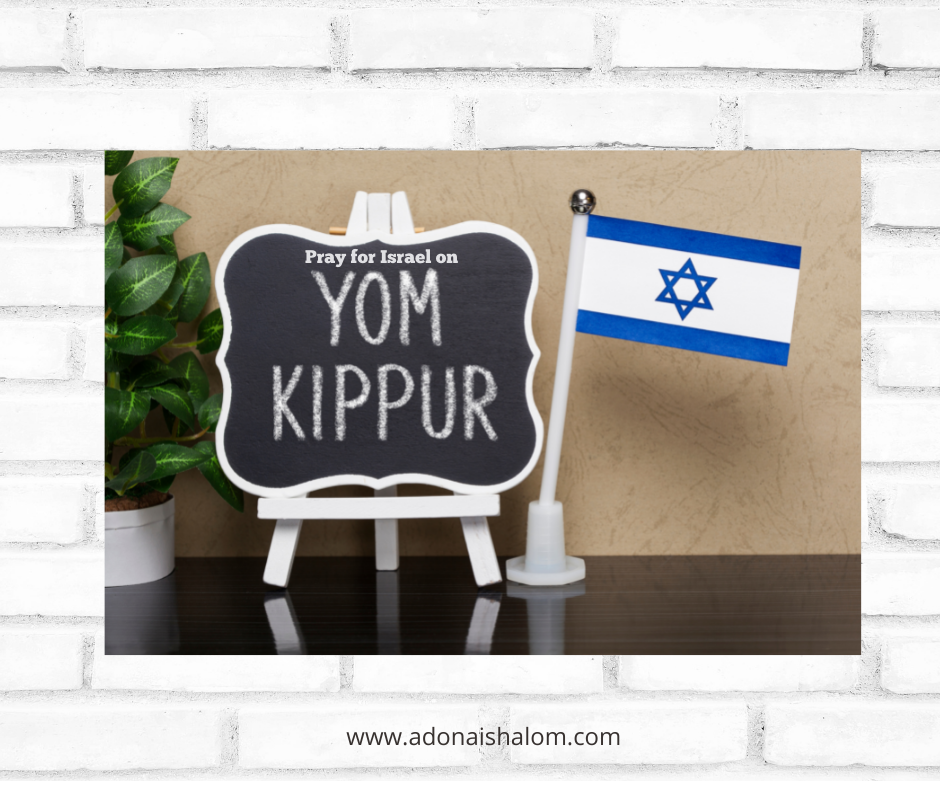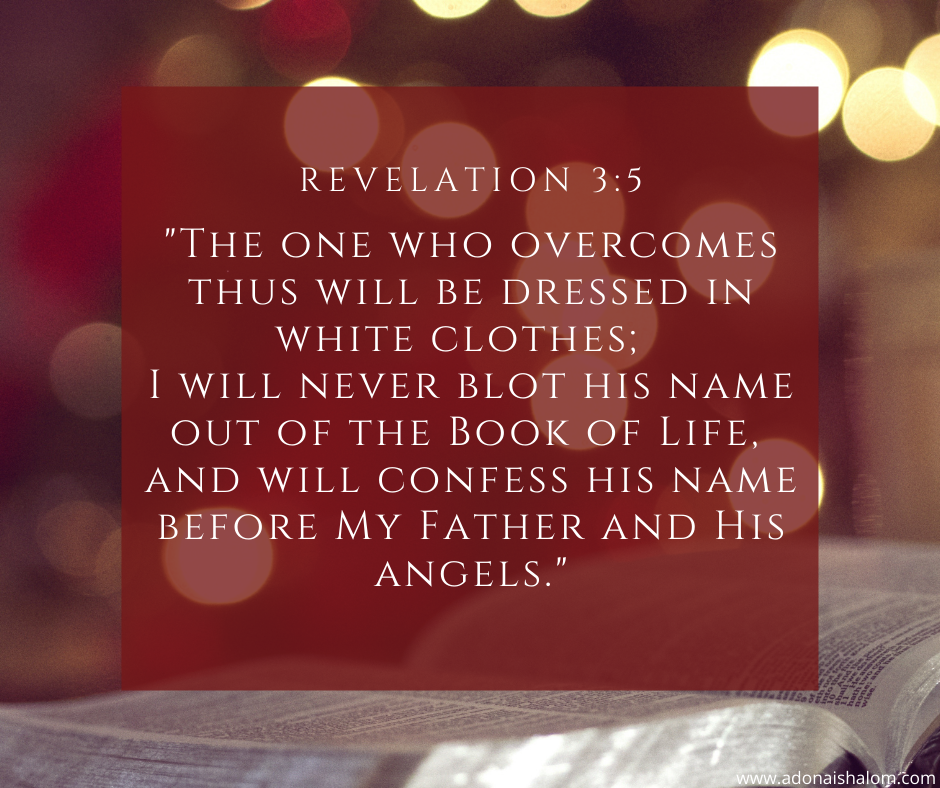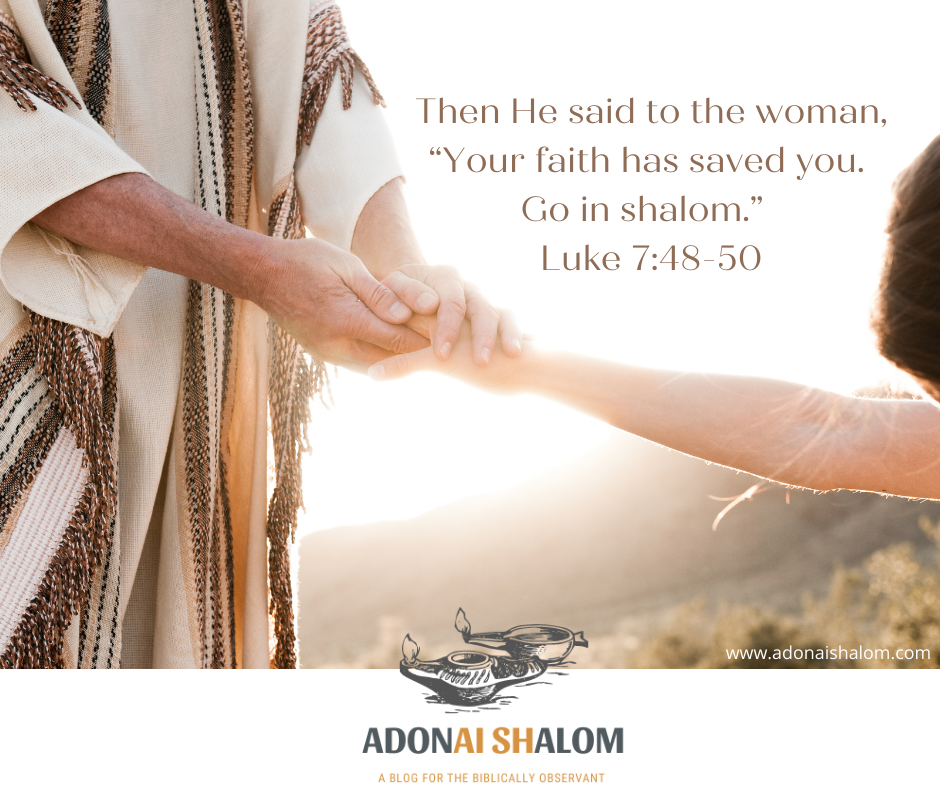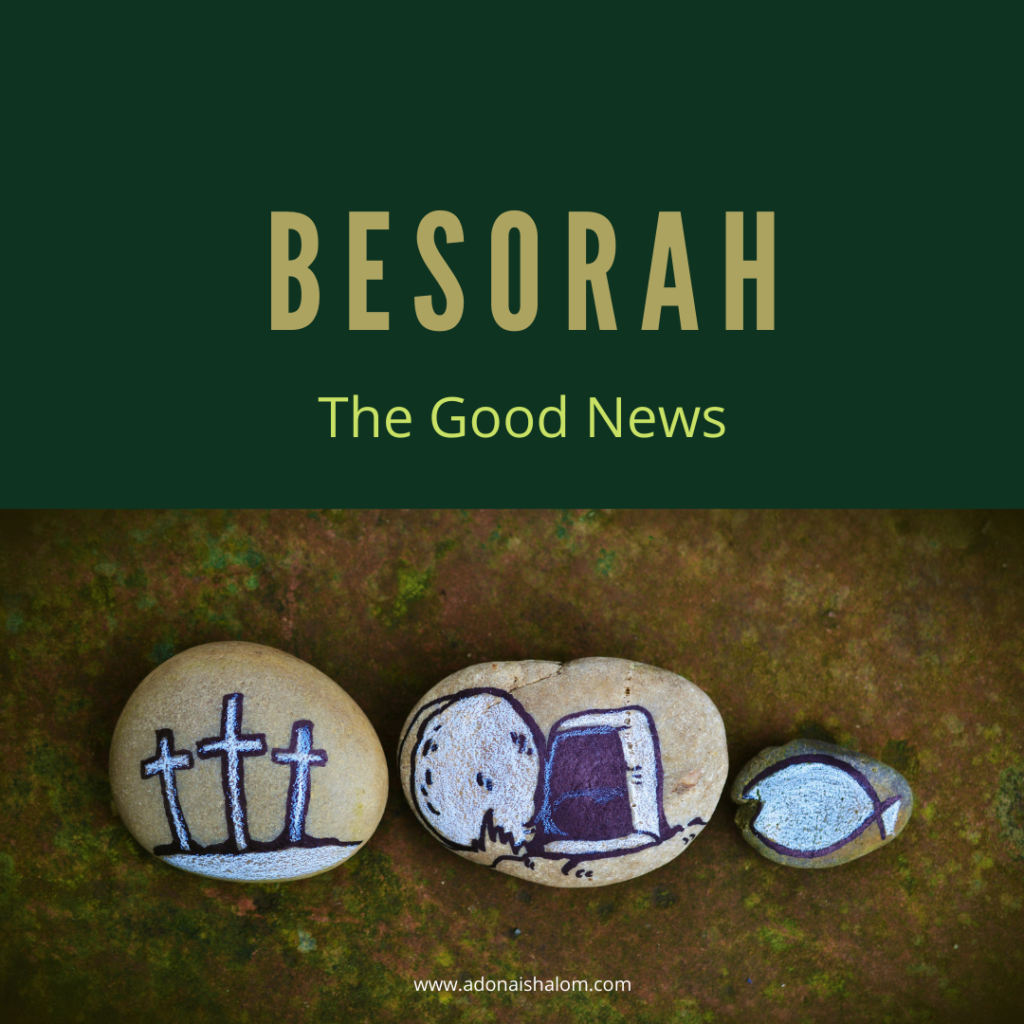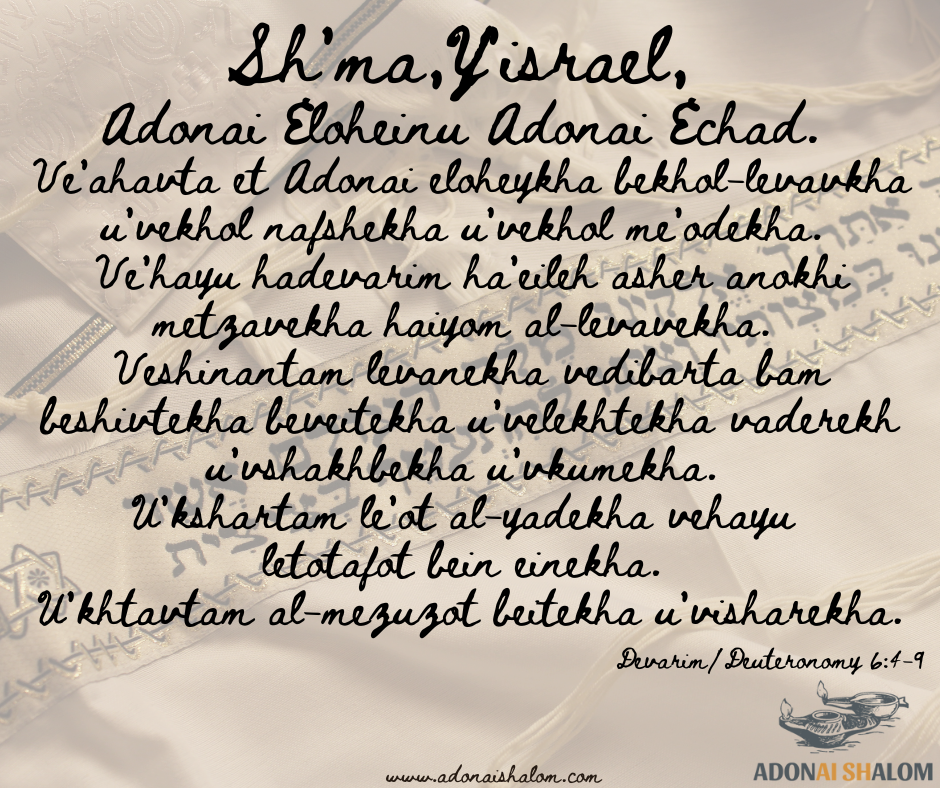Shabbat shalom, mishpocha!
“Remember Yom Shabbat, to keep it holy. Ex.20:8, TLV
May you have a peaceful and restful Sabbath, dear friends.
So Bnei-Yisrael is to keep the Shabbat,
to observe the Shabbat throughout their generations
as a perpetual covenant.
It is a sign between Me and Bnei-Yisrael forever,
for in six days Adonai made heaven and earth,
and on the seventh day He ceased from work and rested.’”
Exodus 31:16-17
“Remember the Sabbath day, to keep it holy.” Ex.20:8, KJV
The Ten Commandments are favored even by postChristian society. They are considered the Tanakh commands that remain “relevant.” Nevermind the 603 other commandments that just so happen to reveal the heart of the Father…. It would be good to at least begin with the 10 that are well-known. Perhaps if we can learn to obey these, we will be on our way to obeying the others. Do we obey out of obligation? No. We obey because we love YHVH.
Why not begin with such a special command? The command to take time on the 7th day of the week to spend time with your Creator.
“Worship God! For the testimony of Yeshua is the Spirit of Prophesy.” Revelation 19:10cd TLV
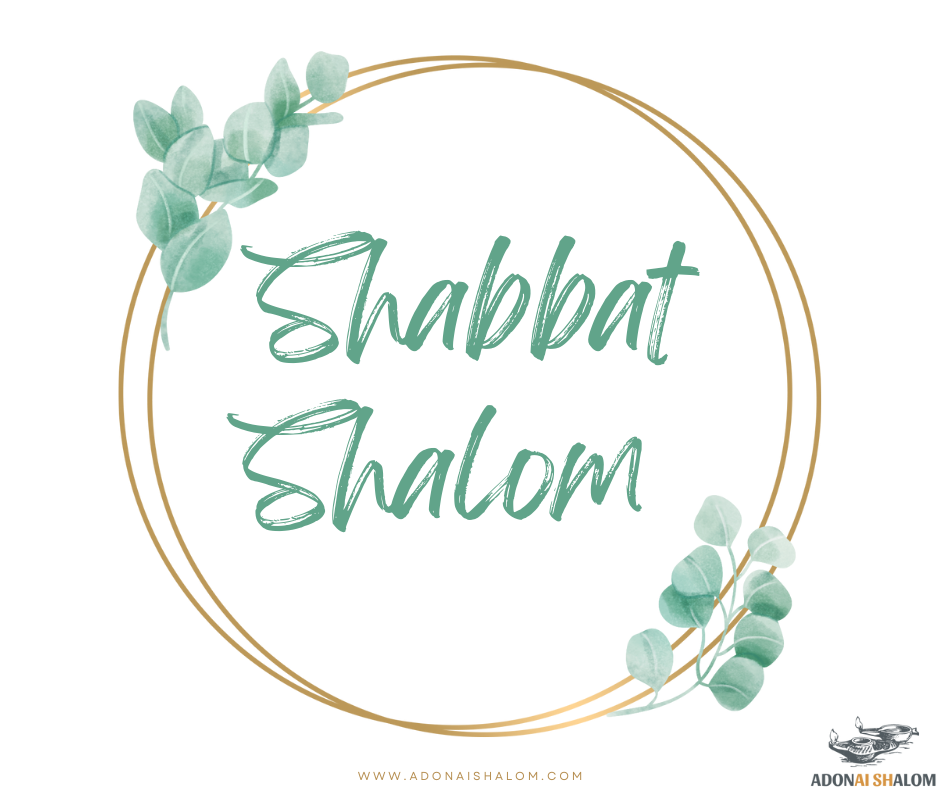
How to pray for Ukraine and Russia
Updated 2/24/22
The Invasion of Ukraine by Russia
As we hear rumors of war and so many nations set themselves on a course to rage against one another once again, we must remember Yeshua’s (Jesus’) words: “Do not let your heart be troubled or afraid.” John 14:27. Update 2/24/22 – Today, the Russian military has invaded Ukraine. We must urgently pray for the vulnerable! Pray for BOTH sides – both Ukrainians and Russians desperately need the LORD right now.
The LORD gives us His divine shalom, His peace, and we must find our peace in Him alone. Placing our confidence in anything else will result only in distress and anxiety.
The aggressions overseas are certainly unnerving to us. How much more so to the people directly affected! Ordinary civilians wanting to live an ordinary life are now facing threats and unrest, and a very uncertain future.
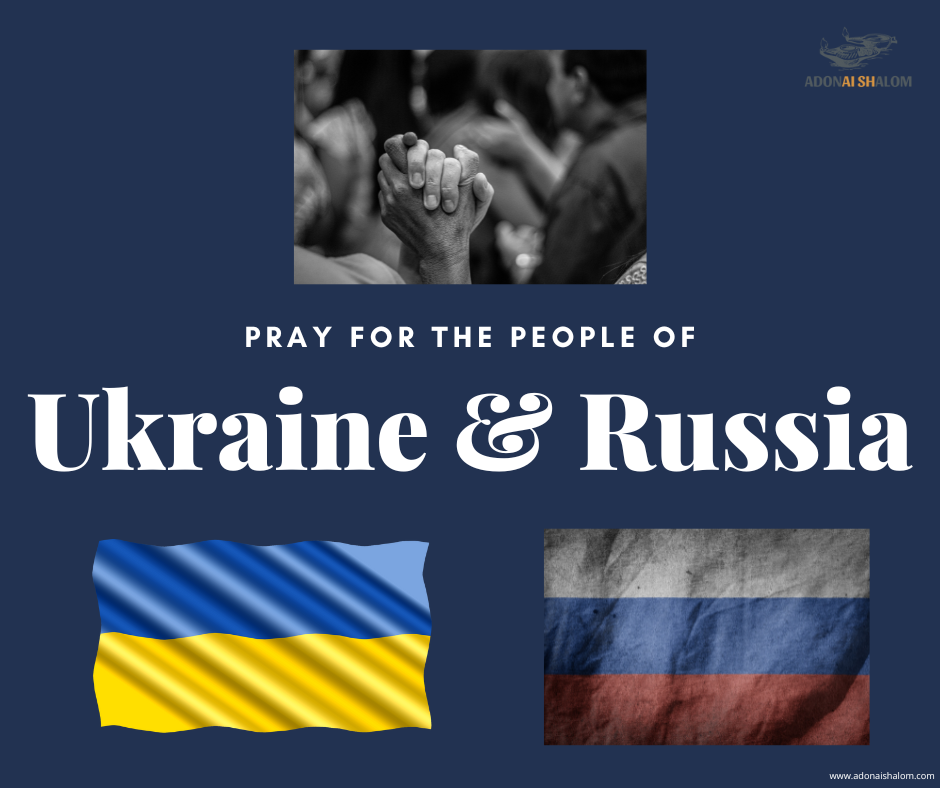
Praying for Ukrainians and Russians
Alas, it is easy to talk about shalom when we aren’t the ones facing missile attacks in our own neighborhoods. Yet all who would believe can find security in the depths of His love and peace. I pray today for the children of Eastern Europe, Ukraine, and Russia, that they would be able to grow up in a free society. Pray for their safety. And pray for those who need medicines. I pray that there would be an awakening to salvation.
We must pray for all of the people of Ukraine and Russia.
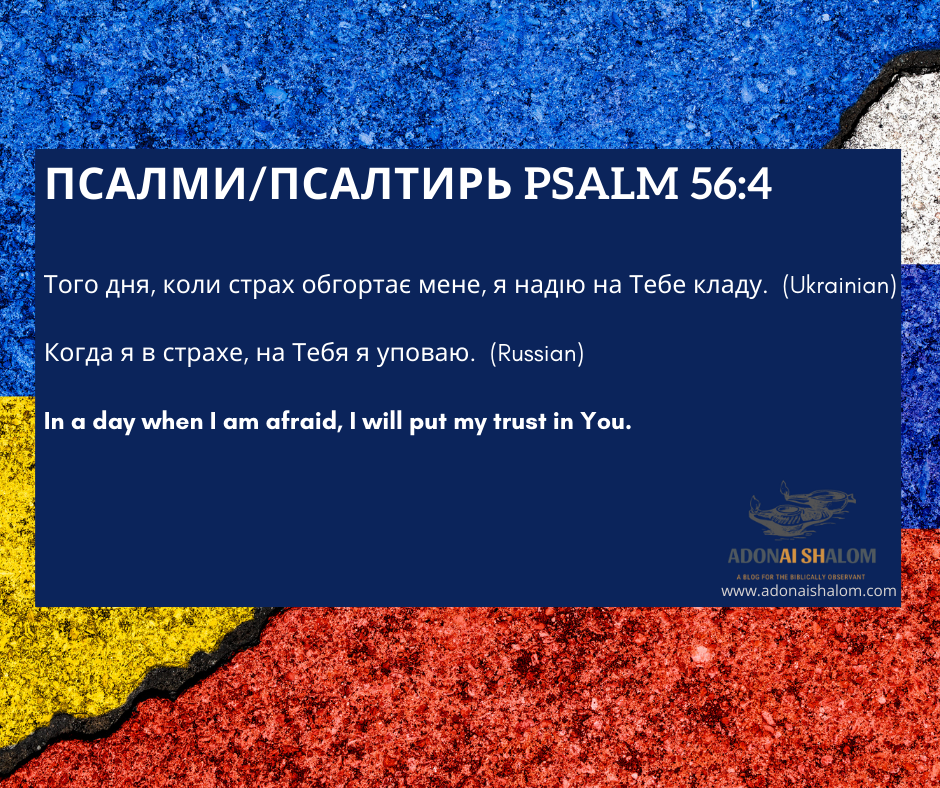
We are in the last days
The Bible is clear that these nations, particularly Russia, will be involved in the final events of the last days, so we should not be shocked or alarmed by what is unfolding.
The Good News of our Messiah can still reach people who live there, and we must pray for them.

Pray for people to be reached with the warmth of Messiah’s love
Eastern Europeans and Russians are frequently stereotyped as being as cold of heart as the Siberian tundra. I do not believe this is true. I do believe many people from these regions have endured much hardship and their demeanor often reflects it. Most importantly, it is not too late to reach them with the warmth of the love of Messiah Yeshua (Jesus the Christ). We must pray that they would come to know His love and His peace.
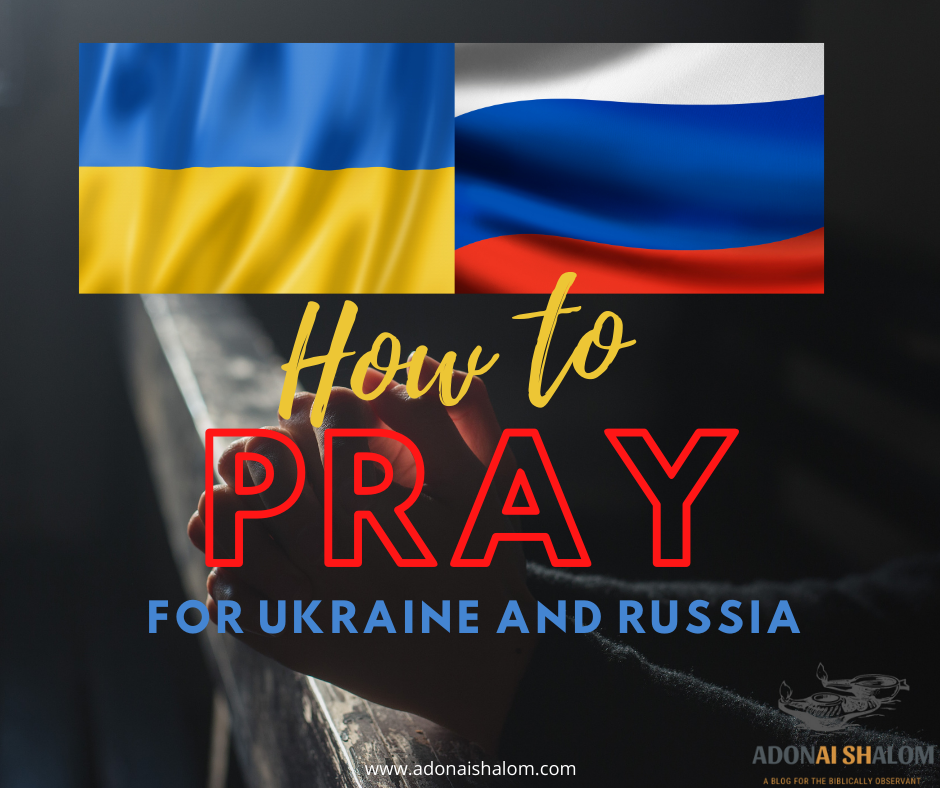
An excellent resource on how to pray during the Ukraine crisis & war
SEND International ministries has compiled an excellent resource on how to pray for Ukrainians and Russians that I found helpful. You may like to refer to this during your personal devotions or with your congregational group: 15 Ways to Pray During the Crisis in Ukraine.
The LORD works miracles even in the midst of great crises, so let us fervently pray that Ruach haKodesh (the Holy Spirit) touches hearts and lives in miraculous, saving ways. There are established evangelical churches and Messianic congregations in Ukraine.
May they be strengthened and righteously emboldened to continue to witness to their friends and neighbors even while sheltering. Let us pray that they will be protected from persecution and poverty. May they be filled with genuine peace.
The Light of Messiah shines in the darkness, and the darkness will never overcome it.
If you will join us in praying for Ukraine and Russia, please leave a comment below. We would love to know that so many of you are uniting in prayer with us!
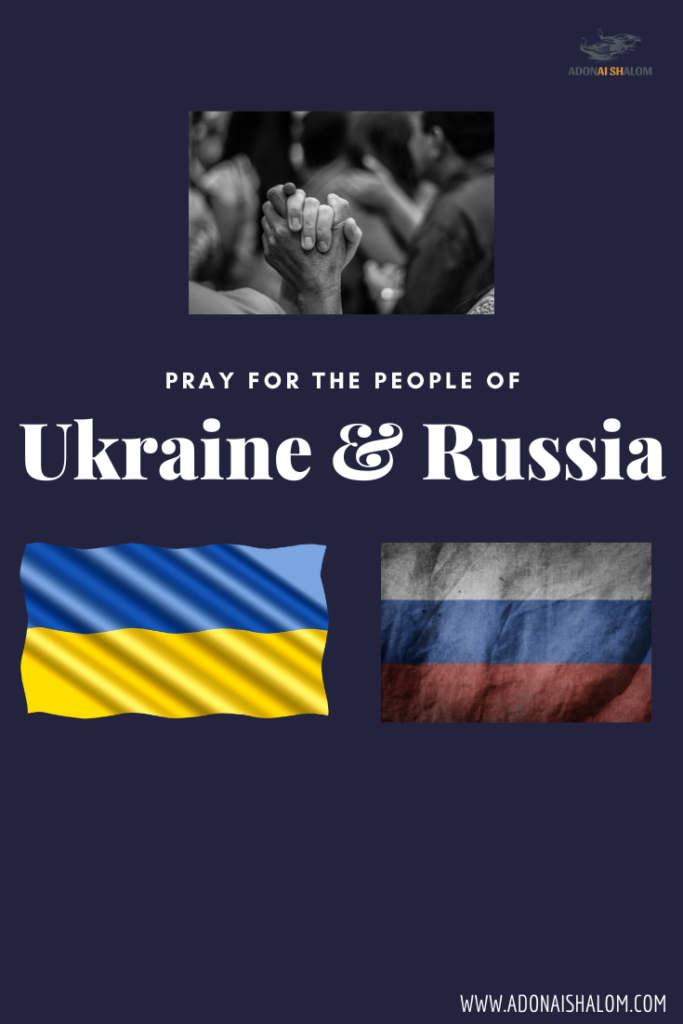
Faith under construction
Parashat Terumah (Shemot/Exodus 25:1-27:19)
If you have spent any time in a large fellowship or congregation, surely you have been a part of a building project or have been asked to contribute a donation to such a project. Whether locating a facility for the first time, renovating an existing building, expanding, or setting out to build a brand new sanctuary, building projects can feel overwhelming. There is fundraising to do and often many of the congregation members will kindly volunteer time and labor to help.
Buildings and Renovations
Building is a natural outworking of our faith. As a community of believers grows, there needs to be a gathering place for worship. The point of the gathering space is to worship, yet so many congregations focus more on physical comforts than on a space that will truly function as a Biblical worship center.
My husband and I visited a church for several months when we were recently married. We were struck by the intensive efforts the church’s leadership was going through to push forth a building campaign agenda. It was clear that the pastor wanted a new space. But we wondered if the congregation truly needed a new space. Was the church growing? It appeared to be. Were there enough parking spaces? Always. The new building didn’t seem to be an immediate need, but we appreciated the fact that the church had plans to grow and to witness in their community. What felt unsettling were the enormous posters containing illustrations of the proposed sanctuary, auditorium-like with movie theatre type chairs and all the opulence of a modern American megachurch.
Humility vs. Comfort
You know what church buildings are my absolute favorite? The small ones. The humble ones. The ones where you can tell the people came together and worked to create a space for worship. The village churches in parts of Mexico that we have visited where all they have are some wooden benches and a pulpit. The people gather because they love the LORD. And He meets them where they are.
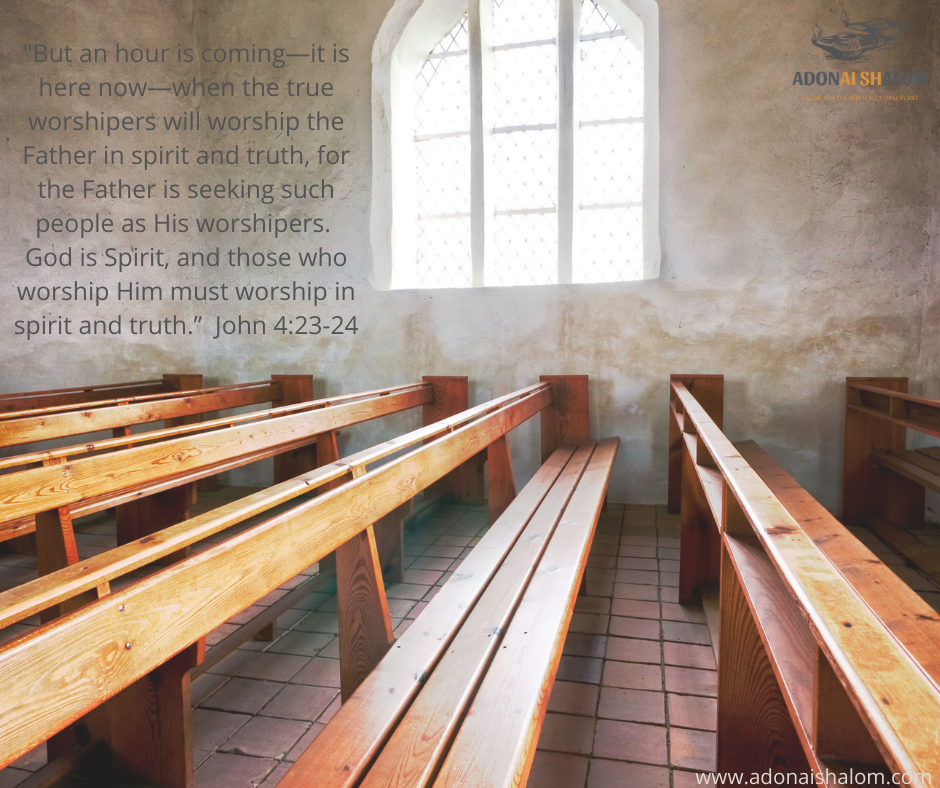
Even here in the U.S., a lot of thought used to go into the worship space from the perspective of how it would facilitate the worshipper to concentrate on the LORD. I grew up in a church that had Congregationalist roots. The design of the sanctuary is one of the best I have ever seen, and I don’t just say that because I grew up there. It is very simple, and the choir was placed in the back of the church. This was done so that the choir was considered part of the congregation and their voices would be heard easily by all. The idea was that regular church members would be inspired to participate in the congregational singing.
Today, most every church arranges for their music team to stand in front on a platform singing at everyone, very much like a concert. The music is so loud that nothing is missed if folks don’t feel like singing along. I am not against having some leadership up in front, but careful consideration about the design of our services and gathering places is warranted. Building campaigns can be a good thing if our focus remains on pleasing the LORD and our spaces have room for genuine, pure, Biblical worship & song, freedom in the Spirit, and Biblical dance.
What is most important in any building is the collective effort put forth in its construction.
Not everyone is a skilled contractor, but everyone can contribute in some way beyond just financially.
Building the Mishkan (Tabernacle)
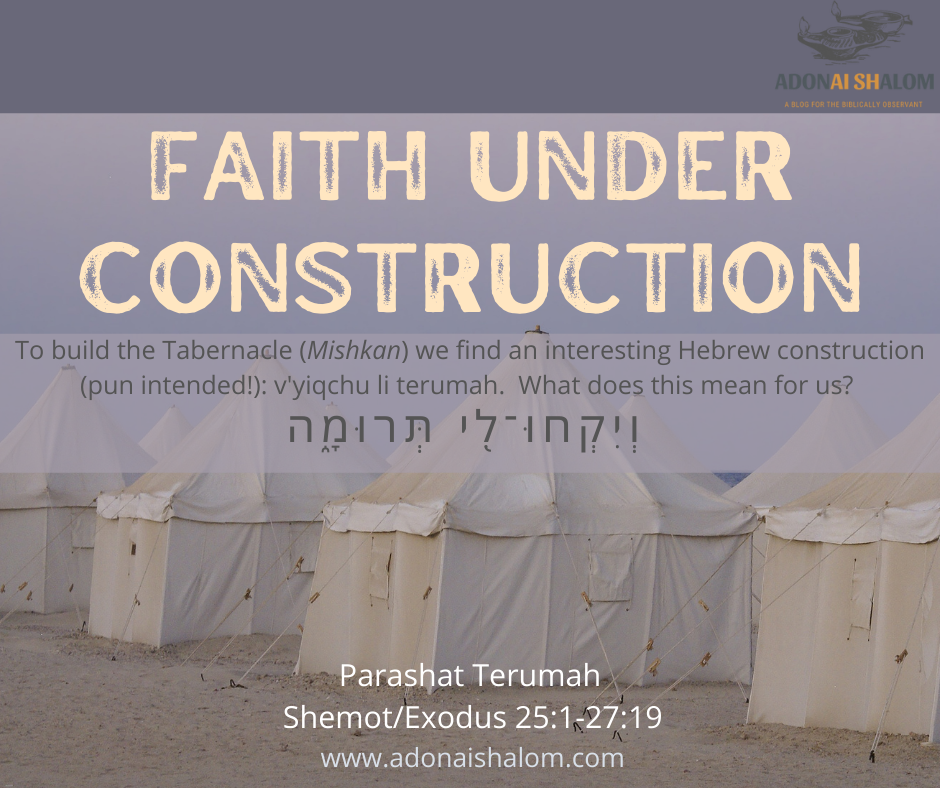
In Parashat Terumah, Shemot/Exodus 25:1-27:19, we can see that building design and collective involvement is important to YHVH. He gave extremely specific instructions about how to the build the Mishkan (Tabernacle).
In Exodus 25:2, there is an unusual Hebrew construction (pardon the pun): v’yiqchu li terumah. “Take for Me an offering/a portion/a donation.” The phrase in Hebrew: וְיִקְחוּ־לִ֖י תְּרוּמָ֑ה. The full verse reads: “Tell B’nei-Yisrael to take up an offering for Me. From anyone whose heart compels him you are to take My offering.”
What is unusual about v’yiqchu li terumah is that it doesn’t say, “Have the children of Israel give to Me.” It seems to suggest more of a compulsion – they are to give! They are to give of themselves – and their hearts ought compel them! If a member of the community will volunteer of their time and talent, they are to do so wholeheartedly!
Furthermore, “for” is a word inserted for us as English speakers. The Most High says, “Take Me.” Take Him into your heart; your body His temple. The tabernacle was designed as a meeting place and He wants an appointment with you, Child of the Most High. “Mishkan” literally means “Adonai will dwell within.” God is asking for a donation – He wants you.
Will you allow the Eternal One to dwell within you?
Will you allow Him to build up your faith and construct in you something beautiful of His own design and perfect plan? Will you focus on what really matters instead of the external accoutrements that tempt us to start church shopping? Will you put on the garments of praise, seek Him in His holy place with all your heart and allow Him to adorn you with the beauty of holiness?
Each of us is a work under construction. The Great Architect has a blueprint, that if you’re willing to follow, you will stand tall as His magnificent work of art. Remember, every building needs a strong cornerstone, and Messiah Yeshua (Jesus) is our Chief Cornerstone:
“You have been built on the foundation made up of the emissaries and prophets, with Messiah Yeshua Himself being the cornerstone. In Him the whole building, being fitted together, is growing into a holy temple for the Lord. In Him, you also are being built together into God’s dwelling place in the Ruach.” Ephesians 2:20-22.
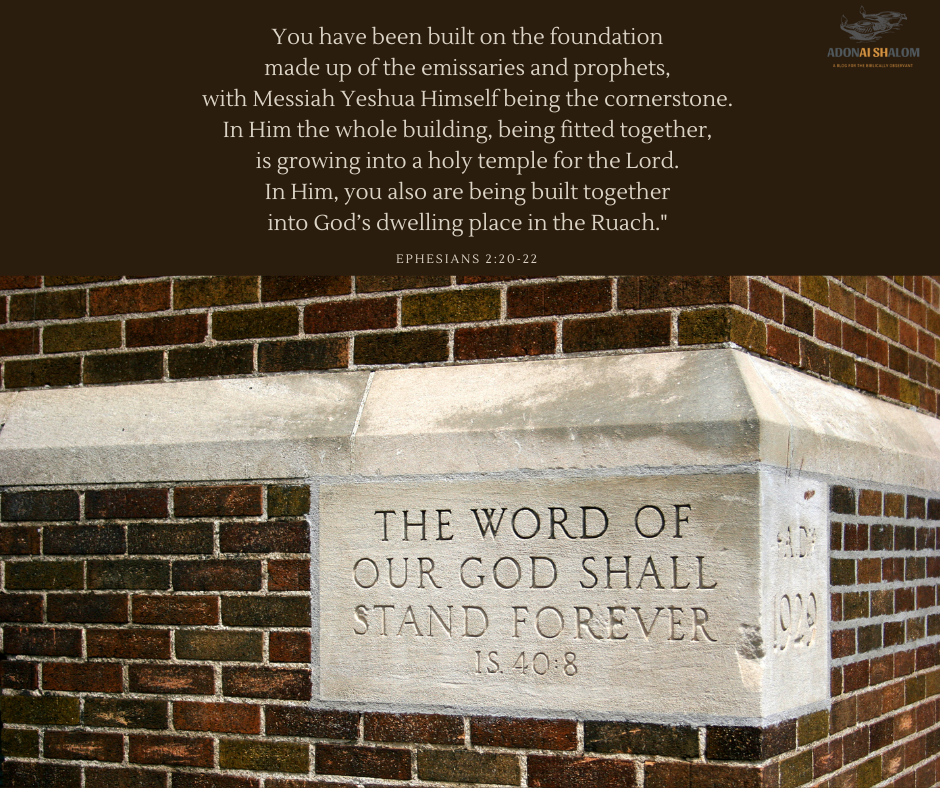
Baruch atah Adonai!
Shalom, reader! I genuinely hope this short message has been of blessing to your life. Please consider sharing it with your friends, that others may be blessed, as well. If you would like to receive more encouragement directly to your inbox, subscribe to the Adonai Shalom list:
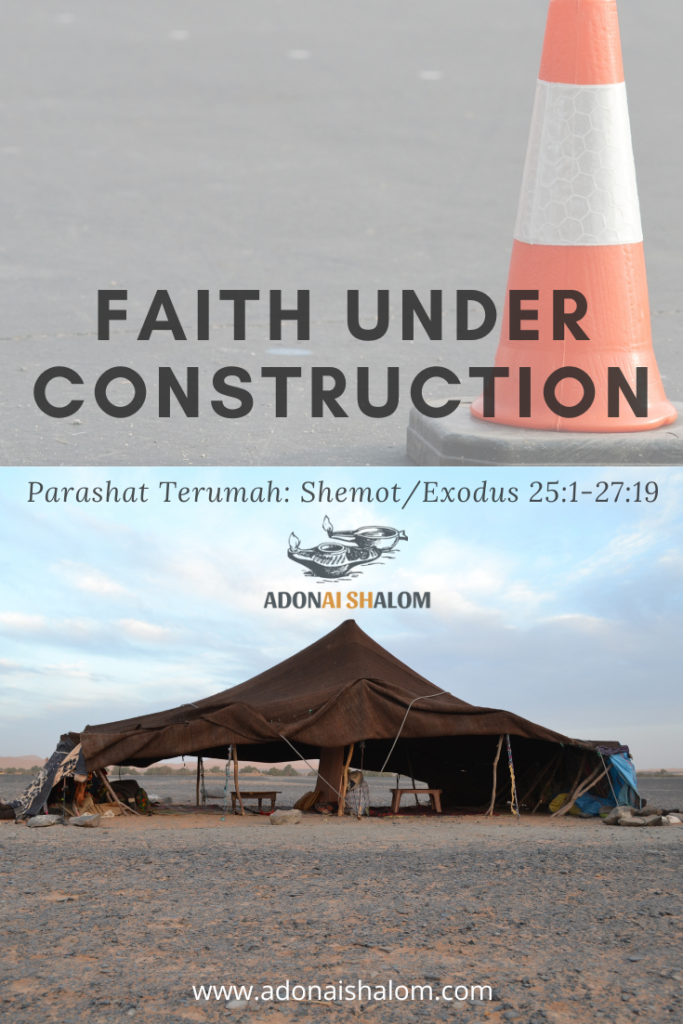
Escaping Egypt
Parashat B’shalach Shemot/Exodus 13:17-Exodus 17
“After Pharaoh had let the people go . . . ” Ex.13:17a
These words of Scripture are well-known to the children of the LORD because here the Word of God describes what happened “after Pharaoh had let the people go . . .” (Ex.13:17a).
We know this book in English as “Exodus” precisely because of this very central event.
Building a new dream
The oppression was over. No longer would the children of Israel (b’nei Yisra’el) be forced to build up Pharaoh’s dreams of towering monuments and elaborate buildings. Now they could build up the dream that had nearly been buried within them – a dream to live in freedom under the authority of their King, the King of kings, the God of Israel.
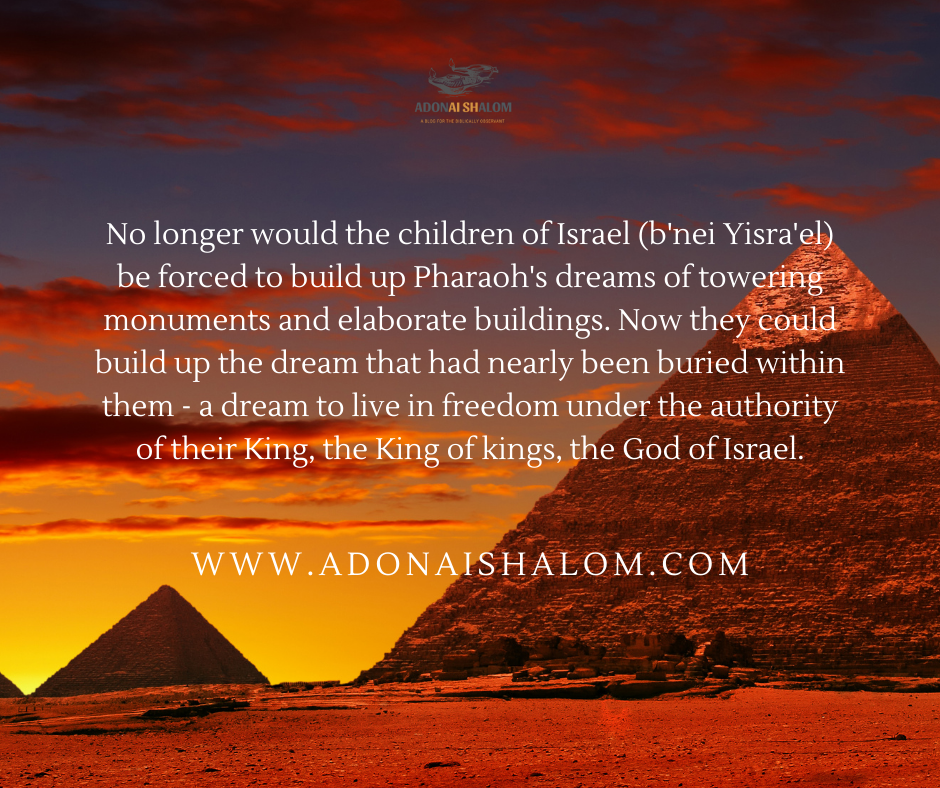
Adonai brought them out of Egypt and was wise in the way in which He led them to their next destination.
Leaving Egypt in faith or in fear? Probably a little bit of both!
Undoubtedly, some of the people of Israel would have been walking out of Egypt as though on eggshells, fearful that their previous masters would come and round them up to shackle them back into their previous enslavement. Their trepidation was not unfounded.
Surely the young ones would have tried to run ahead to get away as quickly as their youthfulness could carry them.
The elders who had the wisest of faith could walk with their heads held high – confident that the LORD had been with them all along, and would not fail them.
They would have sang their own songs just as Moshe (Moses) and Miryam (Miriam) sang and danced in the desert after the Red Sea Crossing.
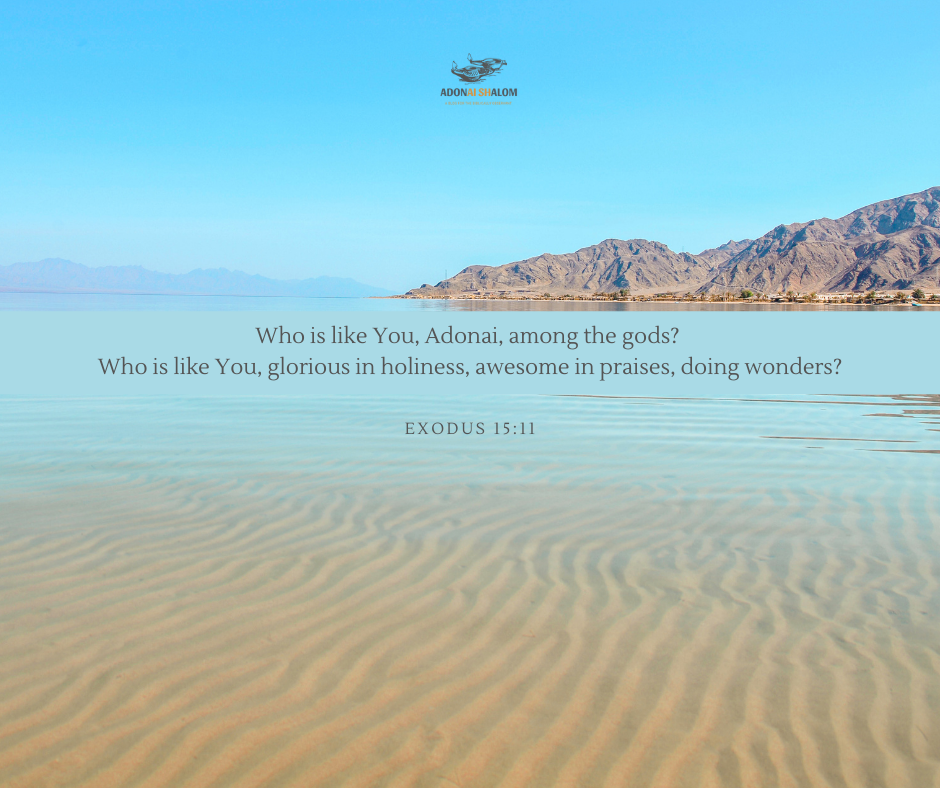
The LORD’s faithfulness to His people to bring them out of Egypt and through tough times has inspired so many expressions of this truth.
Through many dangers, toils, and snares, I have already come.
‘Tis grace hath brought me safe thus far, and grace will lead me home.
Amazing Grace, John Newton, 1779
Did you know that the author of “Amazing Grace,” John Newton, had been a slavemaster? A pharaoh of his time, it is said that Newton experienced a heart change and wrote that famous hymn.
How great a salvation that can change hearts so dramatically.
Things could have been different for the Pharaoh of Moses’ time, but he refused to repent and found his end at the bottom of the Red Sea.
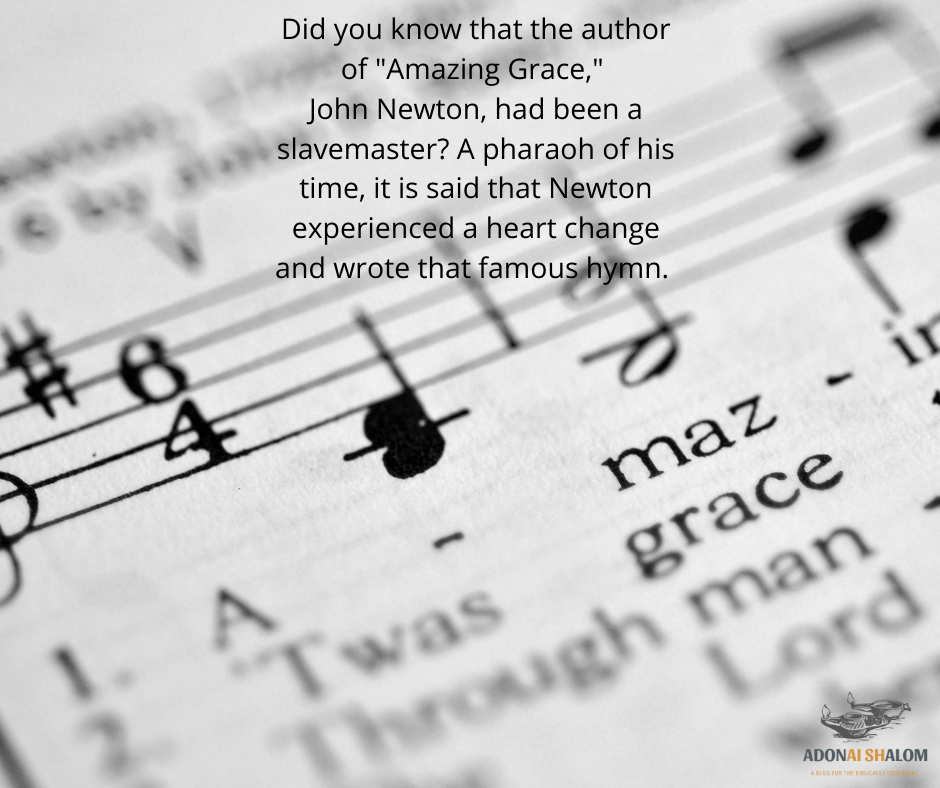
The LORD has done something wondrous in your life! Be confident therefore that He who promised you is faithful (Hebrews 10:23). As Rabbi Sha’ul (Paul) wrote to the Philippians: “He who began a good work in you will carry it on to completion until the Day of Messiah Yeshua.”
It is easy to become fearful, especially when you sense the dangers in life.
The enemy wants to paralyze you with fear, but you can fight back.
Allow the Ruach haKodesh (the Holy Spirit) to endue you with His Holy power and help you to walk in the wisdom of faith.
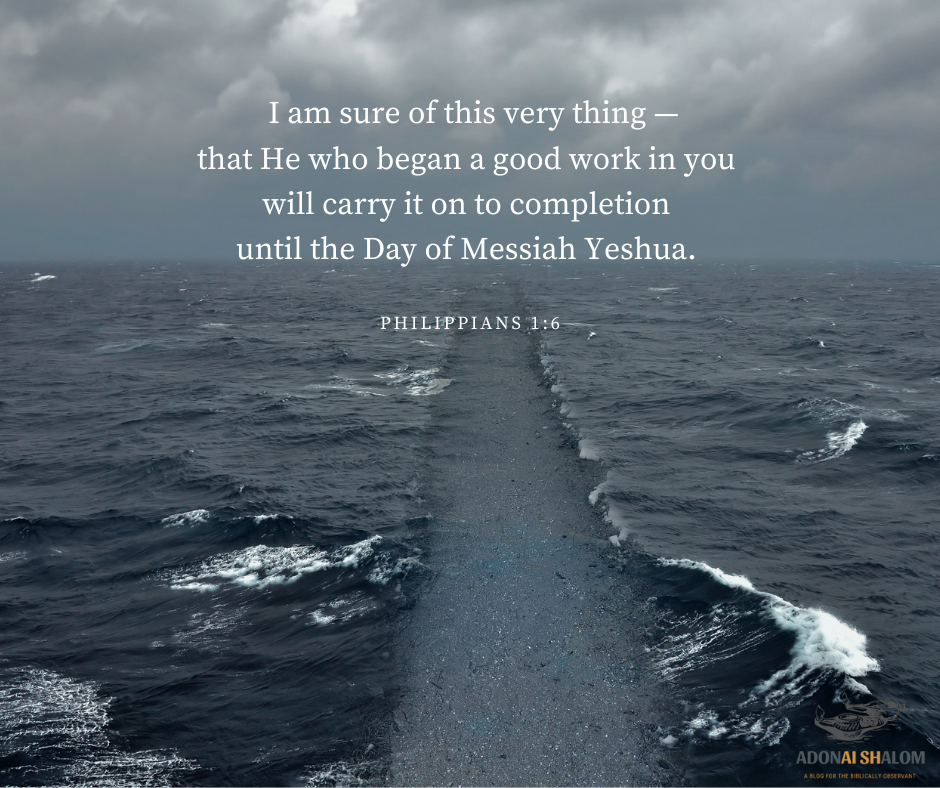
How to handle enemy threats: remember the LORD alone is Sovereign
One road out of Egypt would have led the Israelites straight into the land of one of their enemies: the Philistines.
This passage begins with the concern from the LORD Himself that “. . . .The people might change their minds if they see war . . .” Exodus 13:17
You may be interested to observe that this parasha also ends with talk of war (Ex.17:8ff).
You can be living a very holy life, full of faith, and walking in the freedom granted to you by faith in G-D’s Son, Messiah Yeshua (Jesus), but that doesn’t mean you will not face difficulties.
The enemy will want to surround you, but the LORD Most High decides when He will allow this. The enemy isn’t all-powerful and he must submit to his limitations. Only ADONAI is All-Powerful. Only ADONAI is All-Merciful and All-Knowing, Ever-Present, and Worthy that we put our trust in HIM alone. He will give you the Victory over the enemy!
Are you easily disheartened?
Are you ready for the battles ahead?
The LORD in His Divine Sovereignty knew that many of the people would lose heart and return to their Egyptian taskmasters if they had to face war so soon. “. . . .The people might change their minds if they see war and return to Egypt.” Exodus 13:17
The people were armed (Ex.13:18) but they would not have to fight the Philistines, not yet. The LORD would help them navigate the Sinai Peninsula at a pace that they could handle (since many of them had a grumbling and quarreling habit). Surely the wandering in the wilderness would give them a stamina they would need once they did engage in future conflicts.
Israel faced attack by the Amalekites
It wasn’t long when the Israelites had to indeed fight. They were attacked at Rephidim by the Amalekites. Amalek was a grandson of Esau, and sadly the Amalekites became known as a defiant and evil people. They were so terrible toward Israel that Jewish tradition today equates Amalek to pure evil and darkness. If you know the story of Hadassah (Esther), Haman the evildoer was, you guessed it, an Amalekite. The Amalekites took advantage of the seeming weakness of the Israelites in the wilderness, but by the lifting of hands – Moshe’s in this case – Yehoshua (Joshua) under Moses’ leadership, led the Israelites to victory.
The Amalekites’ behavior was so wicked that ADONAI told Moshe, “Write this for a memorial in the book, and rehearse it in the hearing of Joshua, for I will utterly blot out the memory of the Amalekites from under heaven.” Ex.17:14
ADONAI NISSI
It was after this victory that Moshe (Moses) established an altar, naming it “The LORD is my banner:” “ADONAI NISSI.”
You may enjoy this song that speaks to the victories of the Exodus days. I particularly enjoy this song around Passover, but it is perfect for this parasha, and any time of year of course! His victories never fade, and every day, all year, He is worthy of our exaltation and adoration. He has delivered us and brought us a mighty long way!
If you are looking for another beautiful worship song that relates to this parasha, perhaps you will enjoy this lovely song which uses the words of Revelation 15 describing the song of Moses and the song of the Lamb.
And they are singing the song of Moses the servant of God and the song of the Lamb, saying, “Great and wonderful are Your deeds, Adonai Elohei-Tzva’ot! Just and true are Your ways, O King of the nations! Who shall not fear and glorify Your name, O Lord? For You alone are Holy. All the nations shall come and worship before You, for Your righteous acts have been revealed!” Revelation 15:3-4
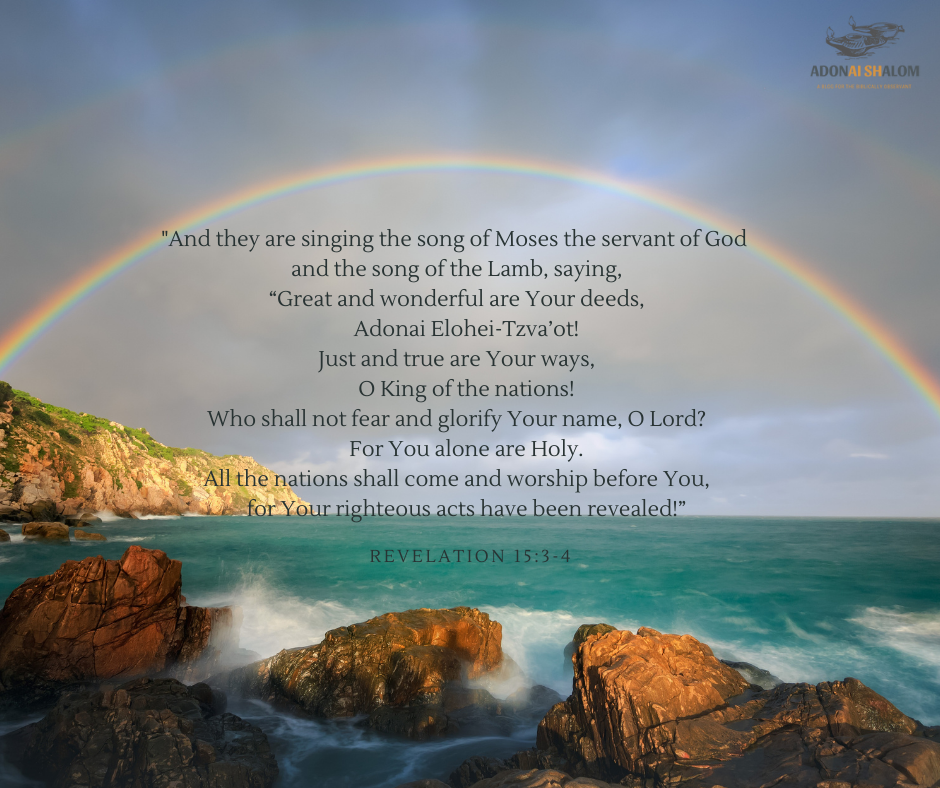
The LORD promises to deliver you
Perhaps you are going through a difficult time right now. Many of us are weary from the ongoing pandemic. Some have been affected by the economic uncertainties and the rising inflation. Perhaps someone you know or loved succumbed to Covid-19. You are not alone.
What ever Egypt you find yourself bound up in, the LORD has promised to deliver you. If you have placed your trust in Him, He will help you through this and bring you to a promised land in which you will find rest and comfort, and peace. Do not fear when the enemy tries to attack you from your blindspots.
Do not take a step out of Egypt only to go back into it.
Wait on the LORD and He will guide you safely across the seas of doubt, depression, anguish, illness, or financial ruin.
He will guide you safely across even when the winds of change or storms of fury attempt to sink your lifeboat. Have faith!
You might even graduate from walking through the waters to walking on the water!
Meet your Savior, Messiah Yeshua, Jesus, the One who calls us all to have enough faith to walk on the waters, keeping our eyes fixed on Him!
Shalom!
Has this message encouraged you today? Please leave a comment! We’d love for you to subscribe to our email newsletter and keep in touch with others who can encourage your walk with Messiah Yeshua!
Hidden on purpose, for a purpose: Yokheved’s son, Moses
Exodus (Shemot) 2 introduces us to Amram עַמְרָם and Yokheved יוֹכֶבֶד (commonly rendered Jochebed in English).
It is important to note that their names are not revealed in Exodus 2. We don’t find out their names until a genealogy reports their names in Exodus 6:20.
Amram & Yokheved, of the tribe of Levi
What is revealed in Exodus 2 is this special couple’s status alone. They are of the tribe of Levi, the priestly tribe. Scripture tells us a daughter of Levi is married to a son of Levi and they have a son.
Amram’s name in Hebrew means “Exalted Nation.” Yokheved’s name means “YHWH is Glory.” Their son would be a deliverer through whom the holy nation would indeed be exalted and the LORD’s Glory made known.
If we do not spend time in study of the Scriptures, we would not realize the richness hidden there. These two Levites in Exodus 2 appear nameless and nondescript, yet look how instrumental they were in Adonai’s plan!
Proverbs 25:2 “It is the glory of God to conceal a matter and the glory of kings to search it out.”
As mentioned above, Yokheved had a son. Scripture describes the baby boy as “delightful!” The situation in Egypt was horrifically oppressive at that time, so due to the danger, Yokheved hid her son. She managed to hide the child for 3 months.
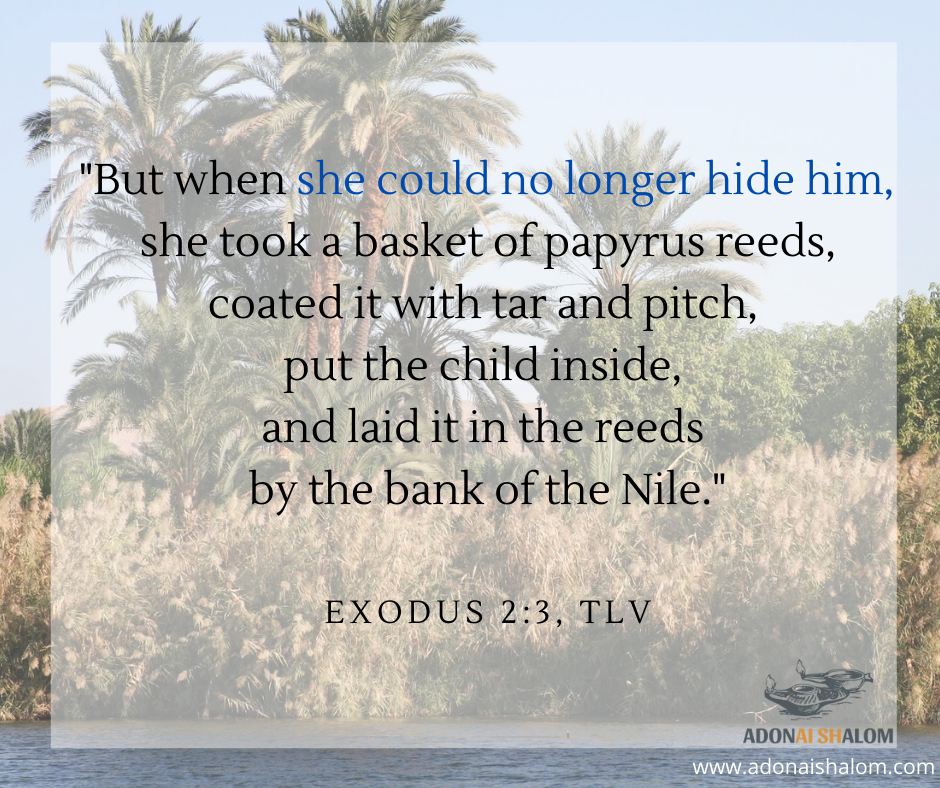
Yokheved was a wonderful mother. She did what she could to protect her baby and trusted in the LORD G-D of Israel as she placed the basket upon the Nile’s waters. And protect him, He did, for this would be no ordinary child: floating in that basket was Moses (Moshe), the one who would lead Israel out of Egypt.
The LORD uses the simplest of vessels – from a basket to a manger – to demonstrate to the world that His power is made perfect in raising up the lowly.
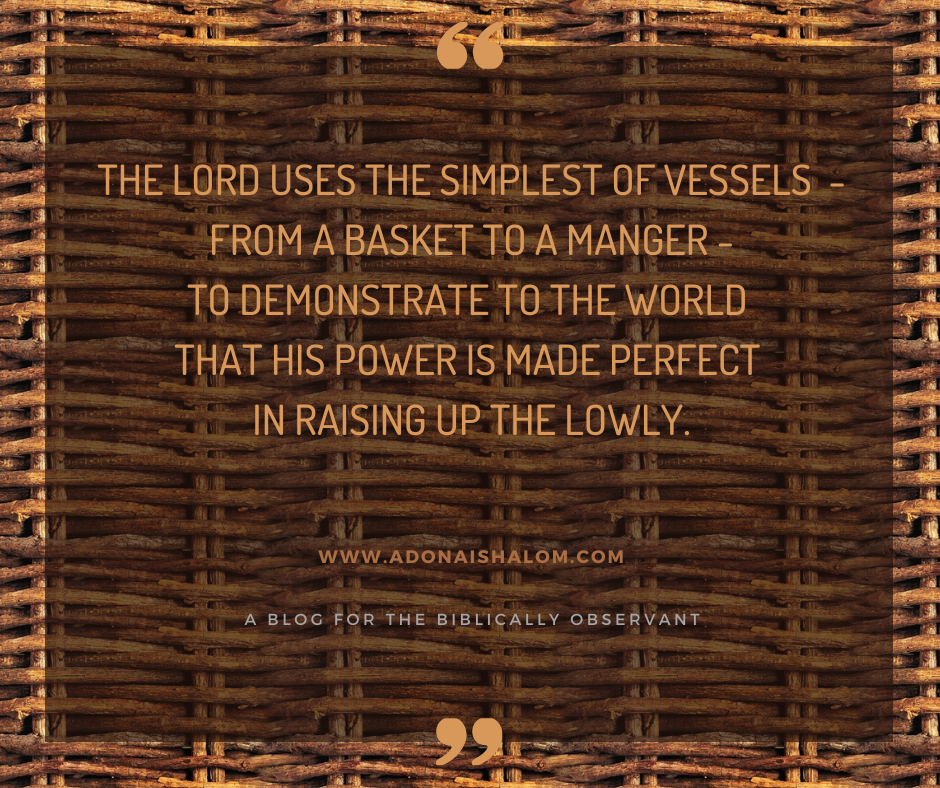
Truly, all that our Heavenly Father has done is marvelous, and always exceedingly above any expectation or level of understanding. He created you, and He did so with a purpose.
What is hidden within you?
What is it that you are hiding within you? Has the LORD placed a burden or a talent or a calling deep within you? If you pray and prepare, the time will come when your gift will no longer be able to be hidden!
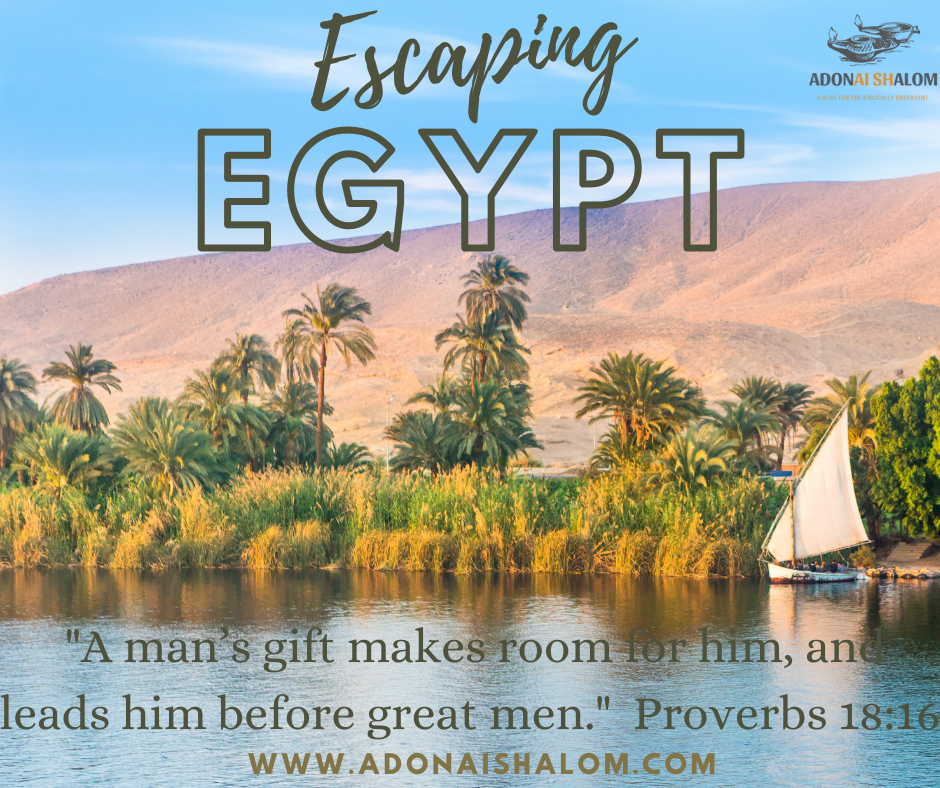
Proverbs 18:16 “A man’s gift makes room for him, and leads him before great men.”
Though Moshe stuttered, the anointing upon his life made room for him even in the presence of the highest authority in the land, and Pharaoh had to cave in and let the people of Israel go. It was a temporary deliverance, but many years later, the Greater Deliverer would come.
And though there was no room in the Bethlehem inn, the Anointed One’s presence alone caused room to be made in the hearts of those who would seek and follow Him. When Messiah Yeshua (Jesus the Christ) came to this world, born in that lowly and humble setting, few understood He was the One who would reign eternally.
Revelation requires an element of hiddenness
Revelation is a key component of Scripture. In order for something to be revealed, it would have to first be hidden. It is a Scriptural principle, and Yeshua taught us:
There is a time and season for all things, and many of those things that were previously unknown or hidden to us have now come to light. Will you faithfully follow the One who has been revealed as Messiah of Israel, the Lamb who was slain, the Savior of all those who would believe, the King of all kings? Will you allow Him to use you, to shield you and to lift you up to impact the nations with the Good News of Messiah Yeshua (Jesus)?
How will you, like Yokheved, trust in the process and witness the LORD’s greatness revealed?
Moshe was of Levitical lineage, which was crucial to the unfolding of Biblical prophecies. If you have come to believe in Messiah Yeshua and have trusted Him with your salvation, you are of royal lineage, too.
Moses was hidden on purpose, for a purpose.
The LORD used him to lead the Israelites out of Egypt!
He made a way where there seemed to be no way, and He can do the same in your life, too.
May the LORD use you mightily and bless you on your journey!
Will you like and share this article with your friends? Would you please subscribe? We would love to continue publishing these messages to bless believers with the Good News of our Messiah Yeshua!
Review: “The Difficult Words of Jesus” by Amy-Jill Levine
Abington Press has generously provided me with a copy of The Difficult Words of Jesus: A Beginner’s Guide to His most Perplexing Teachings by Dr.Amy-Jill Levine, Professor of New Testament and Jewish Studies at Vanderbilt University Divinity School in exchange for my honest review. Thank you both to Abington Press and to Audra Jennings for the arrangement.
Book Review
In The Difficult Words of Jesus, Amy-Jill Levine addresses some of the interpretive challenges presented by what she aptly terms, the “most perplexing teachings” of Messiah Jesus recorded by the Gospels.
One thing that is immediately apparent as the book begins is Dr.Levine’s conversational writing style. She really does make the topic accessible. Having myself studied at Duke Divinity School, I am aware of Dr.Levine’s reputation as a Jewish feminist theologian, and she alludes to this fact throughout the book. It is my understanding that she earned her doctorate at Duke which has probably contributed to her name and work coming up every now and then in classes and conversation. Dr.Levine teaches in mainline Christian seminaries, currently Vanderbilt, but denies the divinity of Messiah Yeshua. She distances herself from the Jewishness of Messiah by referring to Him only by His westernized name as “Jesus;” never as the Hebrew “Yeshua.”
Levine describes Jewish traditions such as bar mitzvah and the High Holidays and compares them to traditional Christian practices. Sadly, she never addresses the continuity offered by Messianic Judaism.
Greek concept of Jesus vs Hebrew Rabbi & Jewish Messiah
According to the book, the majority of Levine’s students participate in Western church traditions such as “Lent” so she is able to remain comfortable talking about the more Greek concept of Jesus without actually encountering Him as Hebrew Rabbi and Jewish Messiah. She does loosely discuss the commandments and other central Jewish teachings. This made reading the book more appealing to me from a Messianic perspective, but it seems that she attempts to teach an inclusive, fairly universalistic message, antithetical to the very exclusive nature of the Gospel’s claim which is that Messiah Yeshua is the one and only begotten Son of God, Equal to God, and is One with God. Messianic and Orthodox Jews alike embrace the Shema. Deuteronomy 6:4‘s exclusive claim: “Hear, O Israel: the LORD our God, the LORD is One.”
שְׁמַע יִשְׂרָאֵל יְהוָה אֱלֹהֵינוּ יְהוָה אֶחָֽד
There is One God, and He has made Himself known as Father, as Son, and as the Holy Spirit. We can gain insight to better interpret the more difficult sayings of Messiah Yeshua by trusting in His Spirit, the Ruach haKodesh. This book does not operate under this core belief. Certainly, it is important to point this out if being used for a Bible Study.
Hermeneutical imagination
I enjoyed Dr.Levine’s ability to draw out the characteristics of people described by the Gospel writers. For example, I liked the way she helps the reader imagine the attitude and behaviors of the rich young man in the Gospel of Mark. She demonstrates her sense of humor! She truthfully writes, “I’m not sure I’d want my children to date him” (Levine, 14). I also enjoyed the section that invites the reader to contemplate: if you could stop Jesus in His tracks, what would you ask Him? Dr.Levine’s question inspired me to write a blog post you can find here. As a professor, she has accomplished her charge to inspire others.
In a chapter analyzing Mark 10:44, “Whoever wishes to be first among you must be slave of all,” Levine again shares her hermeneutical imagination in a way that is thought-provoking. Her social justice sensibilities help with this as she challenges the reader to ” . . . . think of Paul’s Jewish family in Tarsus as at one time enslaved (it does give Paul a different nuance) . . . ” (Levine, 56). I would definitely agree – that does give Paul a very different nuance and would make for intriguing further study.
Christianity & Slavery
Levine questions why Jesus didn’t teach freeing of slaves. She wonders why He didn’t cite Leviticus 25:10 or Jeremiah 34:9-10. It is clearly a topic of interest for Levine as she describes the usages of the terms “slaves” and “servants” throughout the New Testament (Brit Hadasha). In addition, she points out that Westernized “Christianity” and slavery “traveled hand-in-hand through the Roman Empire” (Levine, 58). While I believe these are issues and topics that should rightfully be addressed through careful study and prayer, I again wondered how the less-Westernized remnants of the Jewish followers of Messiah Yeshua would have interpreted these same issues.
Levine does acknowledge that Jesus “identifies [H]imself as a slave, and so did his followers” (Levine, 63). She connects this in a way particularly meaningful to the believer: “Crucifixion was a punishment associated with slaves” (Levine, 63). I appreciated Levine’s deeper look at the Hebrew “eved” as compared to Greek “oiketes” and “doulos.” (pages 64 and 65). Also, the relationship of the “slave” or “servant” to the “Master” who is God/Elohim. She highlights that “for some, indeed probably for Paul of Tarsus, for the followers of Jesus to think of themselves as slaves to God is the ultimate language of freedom, since it indicates that no one and nothing else is in control” (Levine, 70, emphasis added).
Do the Gospels train listeners to hear anti-Jewish sentiment?
Lastly, Levine finishes her book with an emotive chapter addressing anti-Semitism paired with some of the harsher phrases that Messiah used that seem insultive. I don’t know that it is fair to place both topics in one chapter because at various points in the chapter, Levine seems to insinuate that the Gospels train the listener to hear anti-Jewish sentiment by the way in which it is written. I recommend you decide whether or not you agree – read the book for yourself!

There are times when Jesus taught things that seem problematic to contemporary readers. His comments lead to difficult questions about family values, economics, social justice, and religious respect. Jesus spoke 2,000 years ago, but the questions he raises are the ones with which we continue to struggle. In The Difficult Words of Jesus: A Beginner’s Guide to His Most Perplexing Teachings (Abingdon Press), Vanderbilt University professor Amy-Jill Levine gives cultural, historical, and biblical context to some of the most difficult teachings of Jesus to help readers better understand how those teachings spoke to his first-century audience, and how they continue to speak to us today.
Dr.Amy-Jill Levine’s new book, The Difficult Words of Jesus: A Beginner’s Guide to His Most Perplexing Teachings
About the Author: Dr.Amy-Jill Levine

Amy-Jill Levine is University Professor of New Testament and Jewish Studies and Mary Jane Werthan Professor of Jewish Studies Emerita at Vanderbilt Divinity School and College of Arts and Sciences.
An internationally renowned scholar and teacher, she is the author of numerous books including Short Stories by Jesus: The Enigmatic Parables of a Controversial Rabbi, Entering the Passion of Jesus: A Beginner’s Guide to Holy Week, Light of the World: A Beginner’s Guide to Advent, and Sermon on the Mount: A Beginner’s Guide to the Kingdom of Heaven. Her latest release is The Difficult Words of Jesus: A Beginner’s Guide to His Most Perplexing Teachings. She is also the coeditor of the Jewish Annotated New Testament.
Professor Levine has done more than 500 programs for churches, clergy groups, and seminaries on the Bible, Christian-Jewish relations, and Religion, Gender, and Sexuality across the globe.
Title: The Difficult Words of Jesus: A Beginner’s Guide to His Most Perplexing Teachings
Author: Amy-Jill Levine
Publisher: Abingdon Press
Release Date: August 3, 2021
Genre: Religion/Christian Education/Adult
ISBN: 9781791007577
Did you enjoy this book review? Have YOU read the book? Regardless of your doctrinal positions, reading a book like this can definitely be a great conversation starter! So leave a comment! Share what you hope to find in the book! Or, if you’ve already read it, what YOU thought about it!
PURCHASE LINKS: Amazon | Barnes & Noble | Christianbook | Books-A-Million
Pastora Jennifer Mieliulis Fuentes, M.Div., Duke University
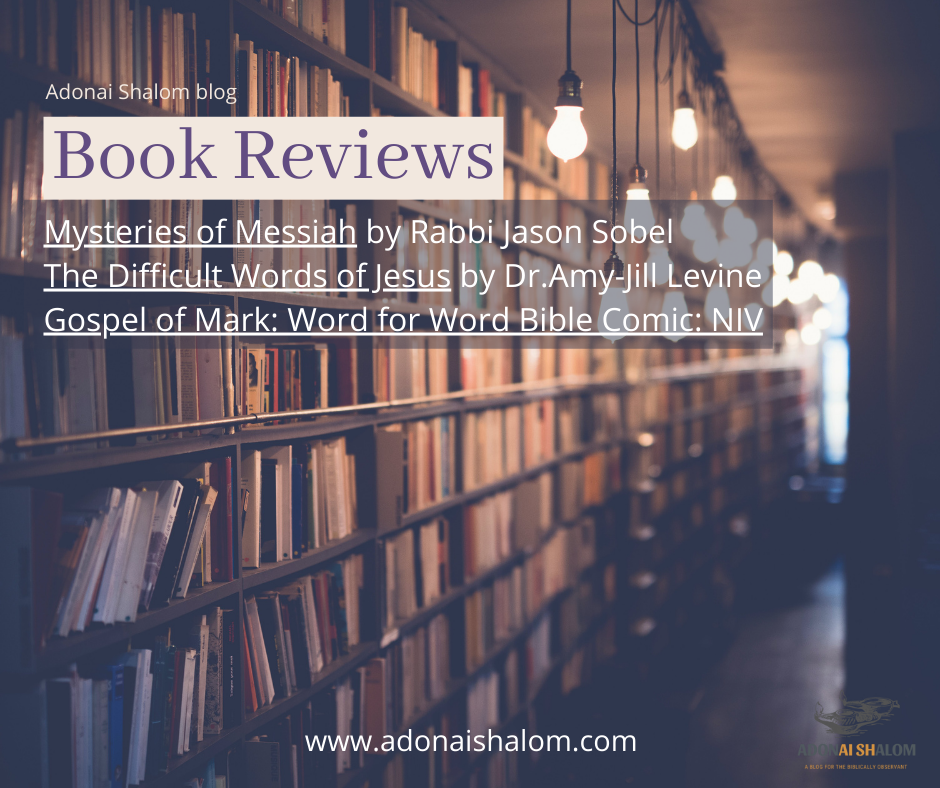
Looking for other books to read? Check out this review of Rabbi Jason Sobel’s book, Mysteries of the Messiah
Living Water at the Feast of Tabernacles: exploring John 7
Updated 10/11/22 5783 B”H
Preparations for the Feast of Tabernacles (Sukkot)
I have posted on preparations for the Feast of Tabernacles (Sukkot) which involves plenty of fun, but today, I’d like to return to the spiritual side of things.
That said, I do want to encourage you: if you have never built a sukkah in your backyard, may this be the year!
The best way to understand something is by doing – by participating.
So, if you want to gain a deeper understanding of how our Savior lived and understand the truly impactful things that Messiah Yeshua (Jesus) said and taught, gaining a solid understanding of what Sukkot/the Feast of Tabernacles is and how it has been celebrated will increase your own Biblical comprehension and give you much greater spiritual revelation.
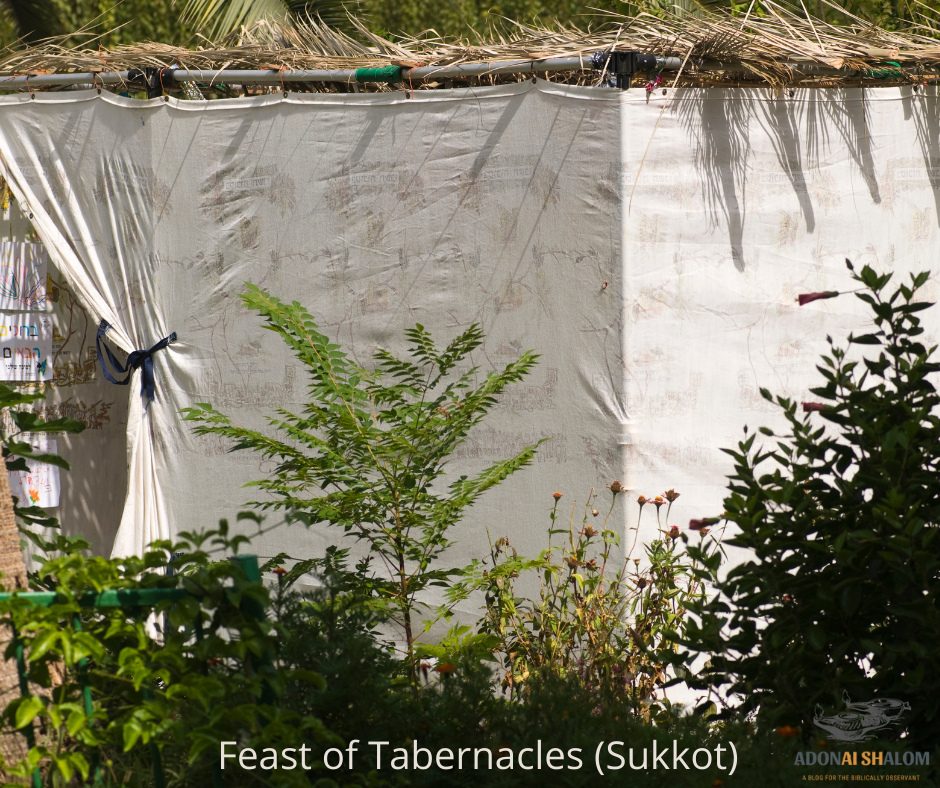
The Significance of John 7:37-41a
The “Last and Greatest Day of the Feast” described by John refers to Hoshana Rabbah, a special day at the ending of Sukkot, the Feast of Tabernacles.
You may recognize the word, “Hoshana” in that term, Hoshana Rabba. We get the term “Hosanna” from this, a pleading for the Holy One to “please save.”
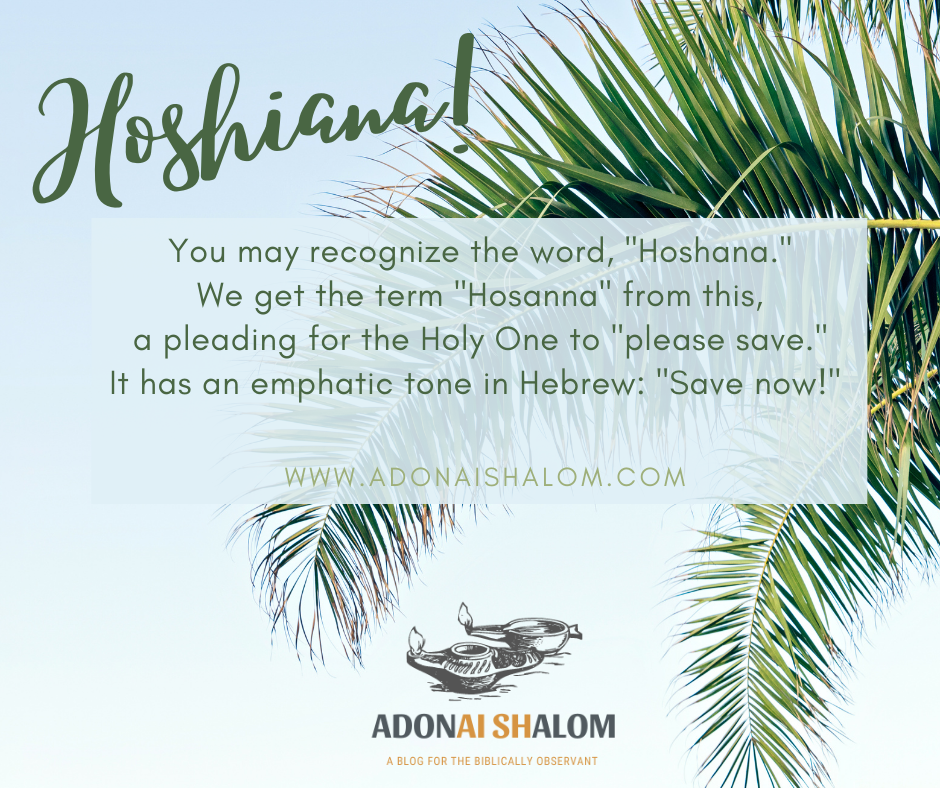
It has an emphatic tone in Hebrew: “Save now!” Hoshiana! It was a special day to plead for salvation.
The Artscroll Siddur (a popular version of the Jewish siddur/prayerbook) contains an interesting prayer for the Feast of Tabernacles’ Hoshana Rabbah (p.757, Sukkos) pleading that God would “remove the . . . partition separating” “us from You.”
Just prior to this prayer, bundles of lulav and etrog with the requisite myrtle and willow are literally beaten on the ground.
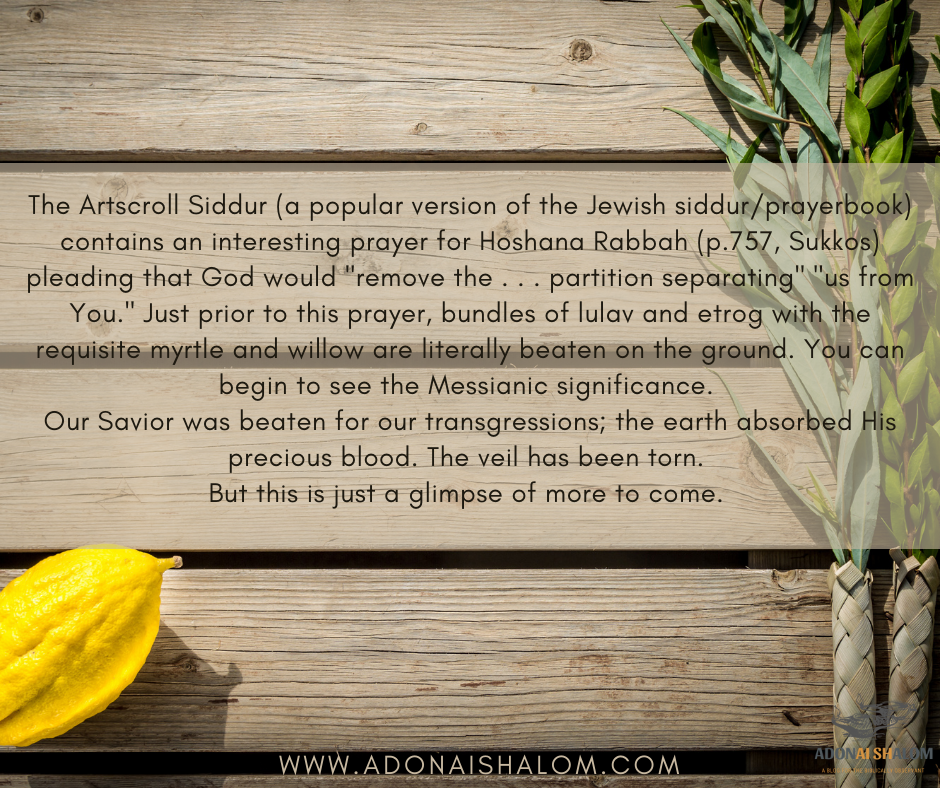
You can begin to see the Messianic significance:
Our Savior was beaten for our transgressions;
the earth absorbed His precious blood.
The veil has been torn.
But this is just a glimpse of more to come.
Sukkot in the Historical Record
Writings in the Talmud and even Josephus describe Sukkot in historical terms, giving full credibility that Sukkot was indeed celebrated every year.
The Talmud and Rabbi Akiva, the prominent 1st century Jewish rabbi, describe the water libations that were part of the Feast of Tabernacle services every year.
The historical record gives us an idea about what every Jewish family would have been accustomed to during the yearly feast.
While the water ceremony was not established by Torah, there is evidence in the Tanakh that the pouring of water had become part of the Sukkot tradition to demonstrate gratitude for rain at least as far back as the time of Zechariah, or soon after, as the prophet definitely references it.
The feast lasted either 7 or 8 days (there is some controversy on how long it actually lasted), but what is certain is that Hoshana Rabbah was an exuberant gathering.

Water was drawn from the Pool of Siloam, brought to the Temple, poured on the altar, and berakhot (blessings) were said, thanking the LORD Most High for rain.
That same pool of water would be the site where the blind man was healed and Messiah’s healing ministry would expand.
The waters would cleanse, purify, and usher in a new reality. The Messiah had come, was standing before them, and He would fill those who believed in Him with His Living Water.
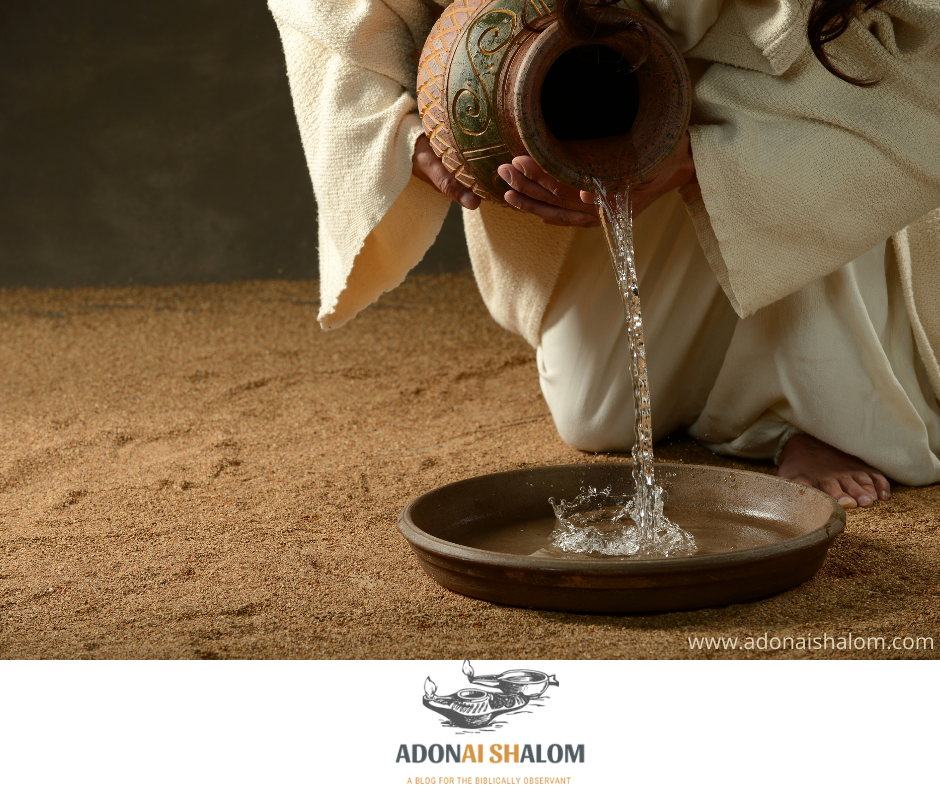
JOEL 2:23
Zechariah warns the nations who do not participate in the Feast of Tabernacles that they will not have rain:
Zech.14:17-19: “Furthermore, if any of the nations on earth do not go up to Jerusalem to worship the King, Adonai-Tzva’ot, they will have no rain. If the Egyptians do not go up and celebrate, they will have no rain. Instead, there will be the plague that Adonai will inflict on the nations that do not go up to celebrate Sukkot. This will be the punishment of Egypt and the punishment of all the nations that do not go up to celebrate Sukkot.”

The people gathered would have been expecting to see the synagogue leaders circling the altar 7 times and they were used to watching the outpouring of water. But they would not have been expecting the Rabbi from Nazareth to declare that He is the source of all Water! His words reveal that He is One with the Creator! And not just any old water, Living Water!
I like the way that Leon Morris succinctly describes this:
“In words reminiscent of those in [John]4:10, Jesus gives the invitation to the thirsty to come to [H]im and drink. There is the implication that the thirsty soul will find that Jesus fills the need that cannot be supplied elsewhere. The appropriateness of the words at this feast is that, throughout the seven days, libations were made in the Temple with water brought from the pool of Siloam (Sukkot.4:9), but on the eighth day no water was poured, and this would make Jesus’ claim all the more impressive.”
Morris, Leon. The Gospel According to John. NICNT. Cambridge: William B. Eerdmans Publishing Company, 1995. Emphasis added.
Celebrating Sukkot
Our Messiah came to dwell with us – to tabernacle with us. The Feast of Tabernacles is so rich in meaning and this post just scratches the surface, but I hope you gained a new perspective.
Sukkot is such a special time for the people of God, and I invite you to celebrate it this year!
If you do, you will be part of a worldwide dress rehearsal, because Scripture indicates future celebrations of this joyous feast!
“Then all the survivors from all the nations that attacked Jerusalem will go up from year to year to worship the King, Adonai-Tzva’ot, and to celebrate Sukkot.”
zechariah 14:16
May you be filled with Living Water and equipped to testify to the nations!
Don’t miss future posts! Subscribe today! Shalom!
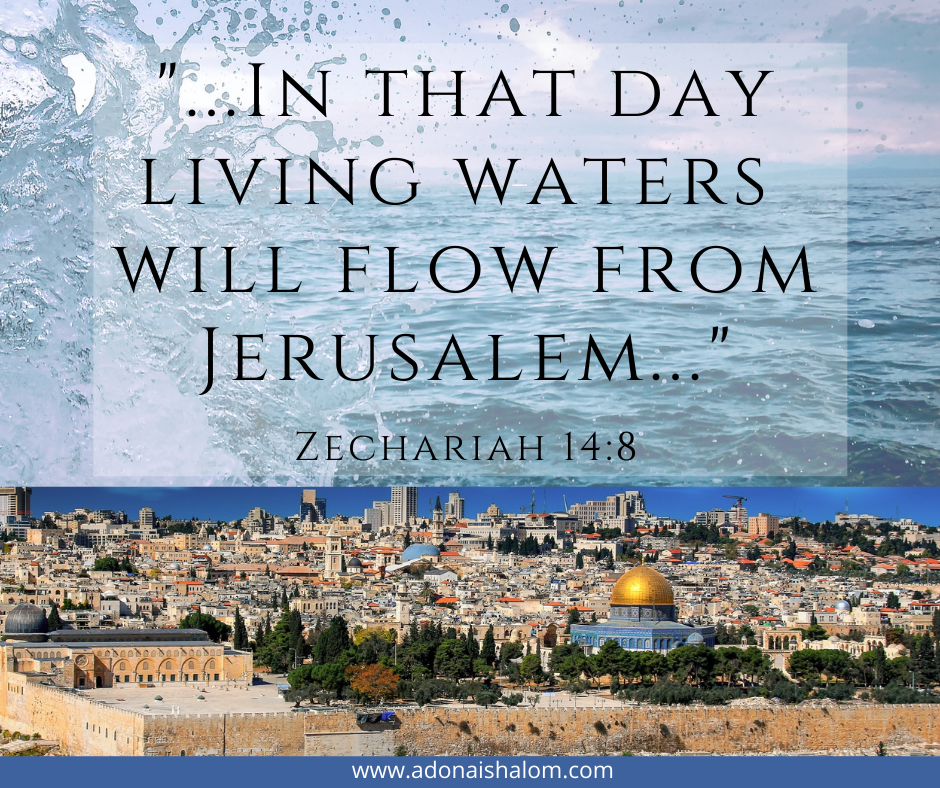
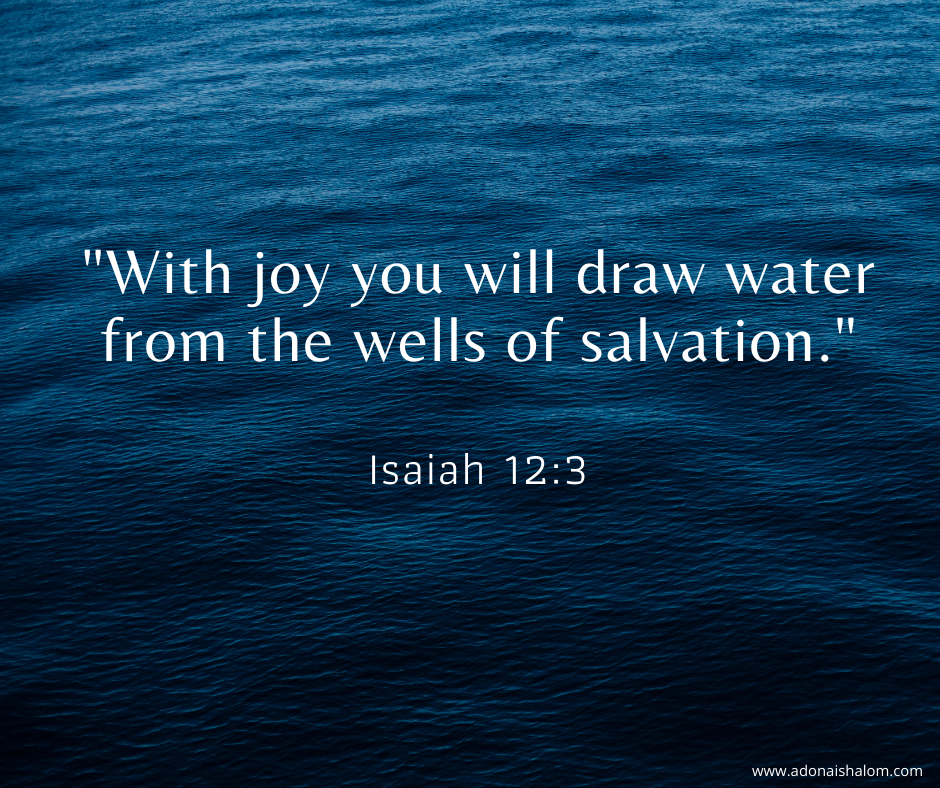
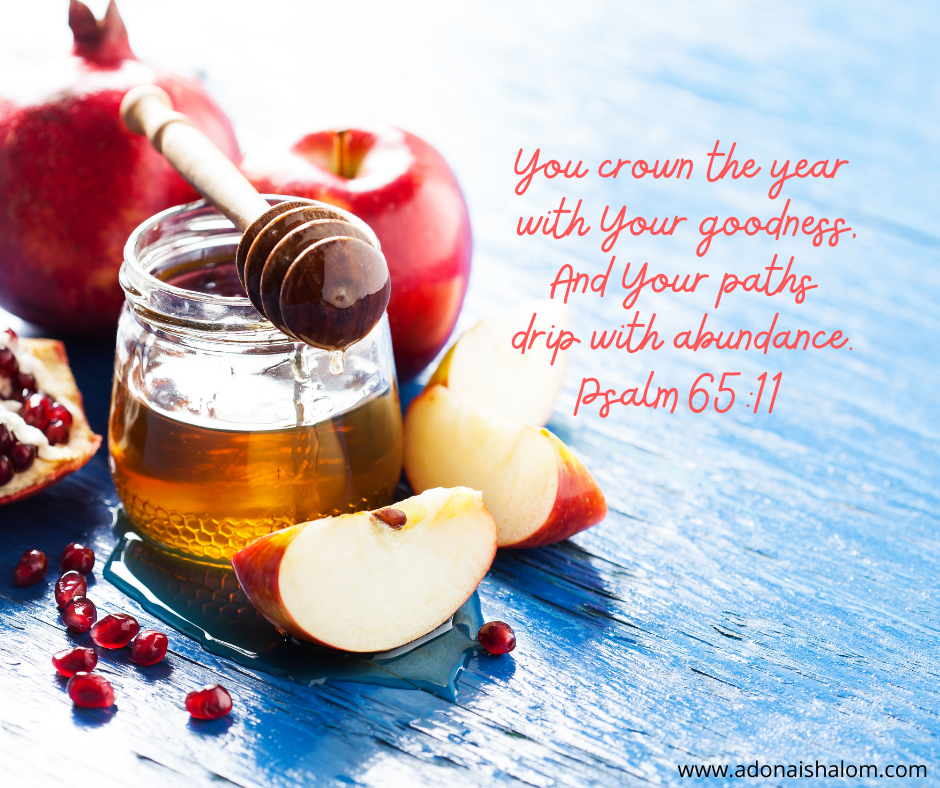
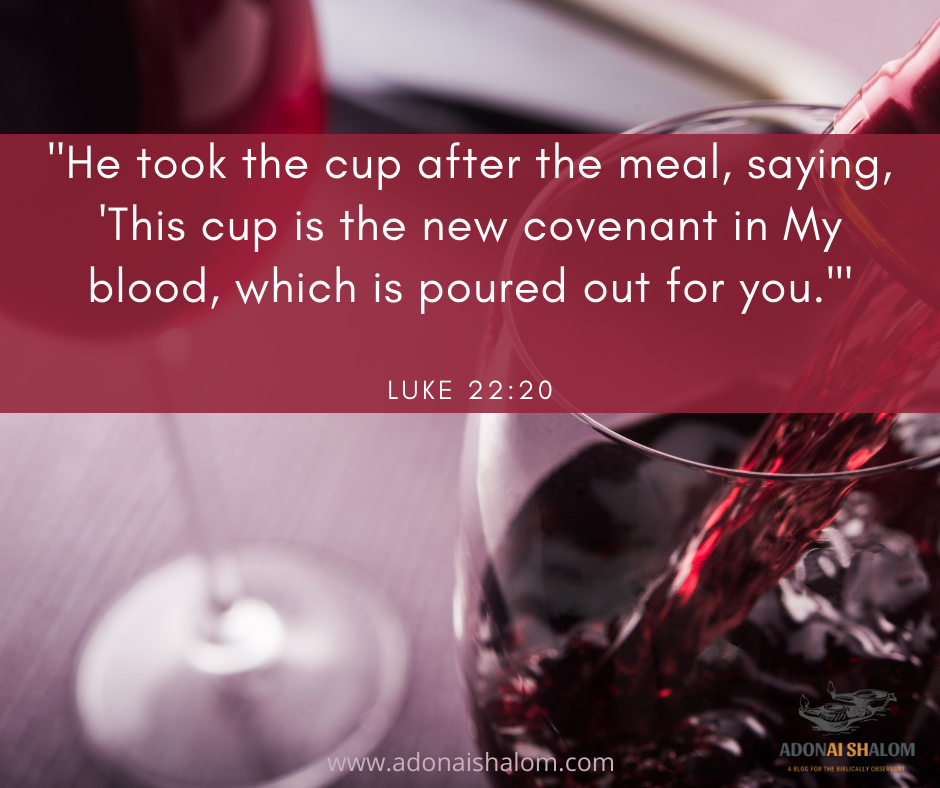
How our family celebrates the Feast of Tabernacles
I love Sukkot (the Feast of Tabernacles) because it gets us outside and is a genuine change in our routine. This year, the boys built a fire pit so the whole family can stay warm during the chilly evenings and, of course, make Sukkot S’mores.
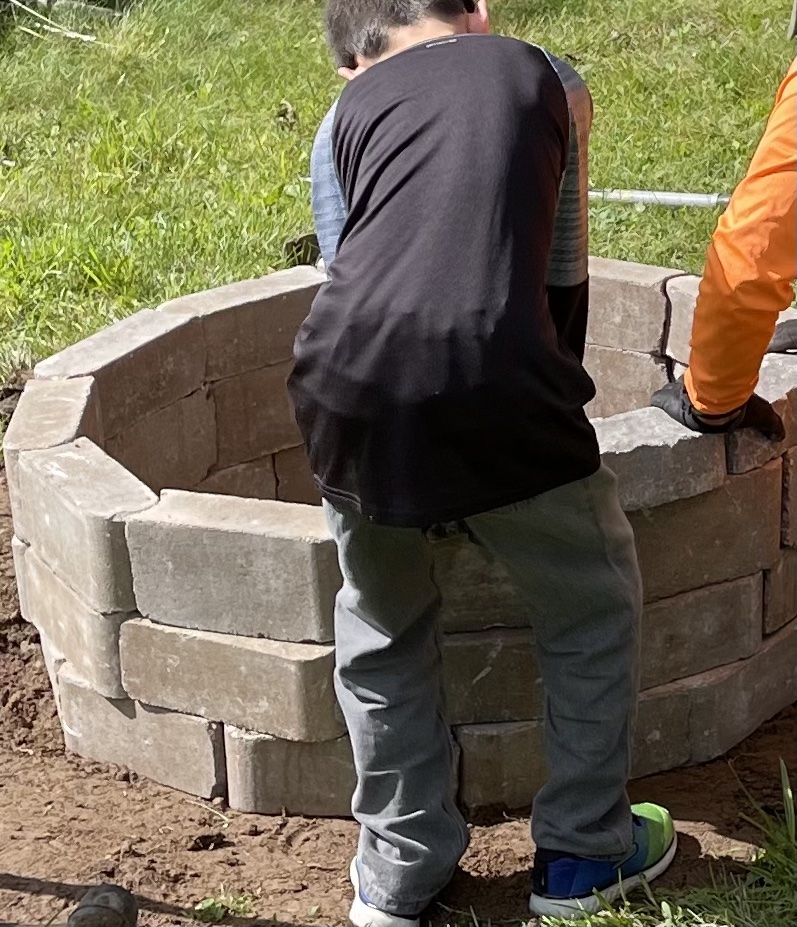
Be sure to include your children in every aspect of the preparation and actual celebration. Not only do they love to be included, this will train them to continue keeping the feast with simcha (joy) as they grow up and have their own family. Our children love to build and decorate the Sukkah with lights and branches and art projects. The Feast of Tabernacles is something they look forward to every year!

Hachnasat or’chim: Welcoming Guests
If you have friends or family who have never celebrated the Feast of Tabernacles, there are so many wonderful (and simple) ways to introduce them to the Biblical feasts by living this out – invite them for a special dinner in your sukkah and have a campfire together. Practice the art of hospitality; you will be blessed as you bless others. Remember, Yeshua (Jesus) loved to eat and drink with His disciples, and even with those the world shunned as “sinners” and “outcasts.” May your tent always be open to the stranger.
The Feast of Tabernacles is intended (indeed, commanded!) to be a joyous celebration – for everyone! – so make it so! Be enthusiastic!
Deuteronomy 16:14-15, TLV, emphases added
Over the years, we have been able to share the richness of Sukkot with so many visitors to our sukkah and it is always a blessing.
Theme Nights and Activities for children, teens, and tweens
I mentioned above that it is important to include your children in ways that make it fun for them.
Some years, we have made edible sukkahs with graham crackers and candies, just like gingerbread houses but way cooler. Hint: get some animal crackers that come with camels. Those are a huge hit with the little ones to put in the “front yard” of your snack.
Check out this Selfie Scavenger Hunt for Sukkot that I put together this year for tweens and teens. They will love the opportunity to use a cell phone and they might learn a thing or two while having fun. Post your selfies on our Facebook page for extra fun!

Many Chabad groups advertise “Pizza in the Hut” nights, which we have adopted as a yearly family tradition. What child will object to pizza?!
If the weather permits and you are up for it, camp out in the sukkah for a night, or the whole week. Kids love sleepover parties. If they’re going to stay up all night, at least this is for a great reason!
Again, if the weather permits, have a cook out! Fire up the grill!
If you do happen to invite guests, have your children prepare something for your visitors. Perhaps an appetizer, or a placemat, or the child could be the host for the evening. They will learn the importance of welcoming guests and practice their social skills.
If you invite many guests or are hosting a sukkah with a congregational group, you could set up various stations. Make caramel apples at one table, paper chains at another table, some edible sukkahs at another, and even a games table.
What are your favorite aspects of celebrating Sukkot? Do you have any other theme night or activity ideas that you do with your family? Leave a comment below!
Menu & Recipe Ideas for the week of Sukkot/the Feast of Tabernacles

Here in the north, planning for Sukkot requires consideration of the temperatures, especially when Sukkot is in October. This year, Sukkot starts in September, so we may not be such Frozen Chosen this year. Even so, the evenings are definitely crisp, so soups and stews are some of the best foods to serve during the feast. I recommend planning at least a week in advance so you don’t need to worry about your menu items during the feast. The best advice I can give is: keep it simple. Have a tray so you can easily transport food from your indoor kitchen to the backyard and vice versa.
I always make sure we have plenty of fresh apple cider. It’s versatile since it can be served warm or cold and is the perfect autumn beverage. Besides apple cider, we always have coffee, hot chocolate, and tea on hand.
If you keep Shabbat, chances are good you own a slow cooker. Make your favorite taco meat and assemble some tacos. An easy-to-transport meal when its ready.
You can make a charcuterie platter with some cheese, crackers, and hummus.
This year I am planning to try this recipe by Tori Avey for a healthy curried vegetable stew.
I will probably not have time to make these, but this dessert recipe for Sukkot Lemon “Etrog” Cupcakes from 18 Doors looks scrumptious and so very festive!
Emphasizing Righteousness and Holiness
All the fun aside, the real reason any of us are celebrating the Feast of Tabernacles is because we take the Bible seriously. The appointed times outlined in Scripture really are like “appointments” with our Heavenly Father. We meet with Him, and He meets with us and we are grateful because in the original tabernacle, there was a veil of separation that has now been torn apart.
Let your Light shine during the Feast of Tabernacles and say “no” to trunk-or-treat nights
One thing I have found troubling among traditional “Christian church” ministry groups is that most of them now host “Fall Festivals,” “Trunk-or-treat” nights, and other “Harvest” activities. These autumn outreach events do not have anything to do with the Feast of Tabernacles or any aspect of the Bible for that matter, yet plenty of time, money, and effort is put into them. Attempts to justify the events always circle back to “evangelism.”

We do not need to imitate paganism.
It is as if these churches balk at Scripture (many unintentionally, I know). Sadly, rather than being unique and set apart from the world, they are in many ways adapting to the world. With Sukkot often being in October, the very best alternative to the satanic feast of halloween is to light up the week of Sukkot in your sukkah and pray for your neighborhood. Shine your light during God’s appointed times and do not participate with the devil’s feast. The Eternal One’s light will always shine brighter – Yeshua isn’t in a competition. He already won.
Some argue that “trunk or treat” is just a fun time for children to dress in costumes. If you want your children to dress up, why not simply abandon the devil and his evil imitations and allow them to dress up for a much better celebration during Purim? Our children do not feel they are “missing out” on halloween. They know they will get to dress up and get plenty of candy during Purim in the springtime. They, too, have no desire to associate with the darkness.
2 Corinthians 6:14: . . . . What fellowship does light have with darkness?
The best opportunity you will have to evangelize is to live out the Bible. The opportunities to share the Good News of our Messiah will be plentiful.
How will you celebrate the Feast of Tabernacles this year? Where will you be? I hope to celebrate some day in Israel! Leave a comment, share, and/or subscribe! We’d love to hear from you! Chag Sukkot sameach!
Yom Kippur and Messiah’s return
updated 10/3/22 5783 B”H
What would it be like to experience forgiveness . . . only one time a year?
If you know anything about the Jewish holy days (Biblical feast days), you may know that Yom Kippur is the Day of Atonement.
Strict repentance and special rituals had to be completed (as outlined in Leviticus 16 and Leviticus 23) in order for the Israelites to – yearly – receive forgiveness.
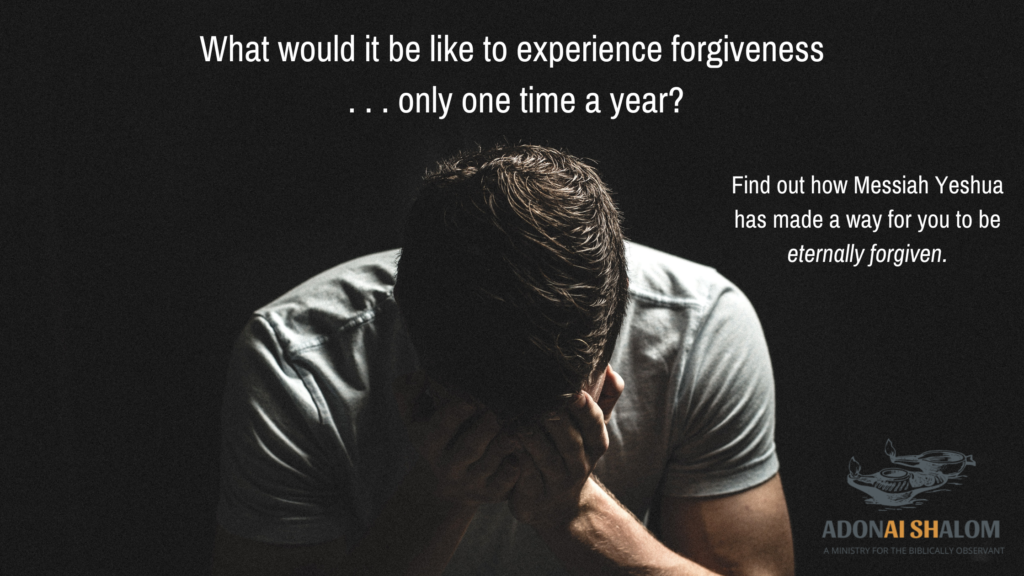
It has been traditionally believed that the names of the forgiven are written in the Book of Life on Rosh Hashanah/Yom Teruah, and sealed for the year on Yom Kippur.
The pressure must have felt intense. The fear of missing the mark could have been debilitating.
Failing in just one point could render the religious practitioner disqualified.
Talk about feeling burdened.
Maybe depressed.
Probably overwhelmed.
And definitely hungry. (It is a day of fasting!)
There was an element of hope, though.
Yom (Hebrew for “day“) Kippur (Hebrew for “atonement”) was considered the most Holy day of the year because the High Priest would enter the Holy of Holies to conduct the requirements for atonement on behalf of the nation of Israel.
Every year, the ceremony was to be repeated, a rehearsal for a future spiritual reality.
Besides prayer, song, and worship, the shofar is sounded, both to bring the assembly together and serves as an alarm of proclamation.
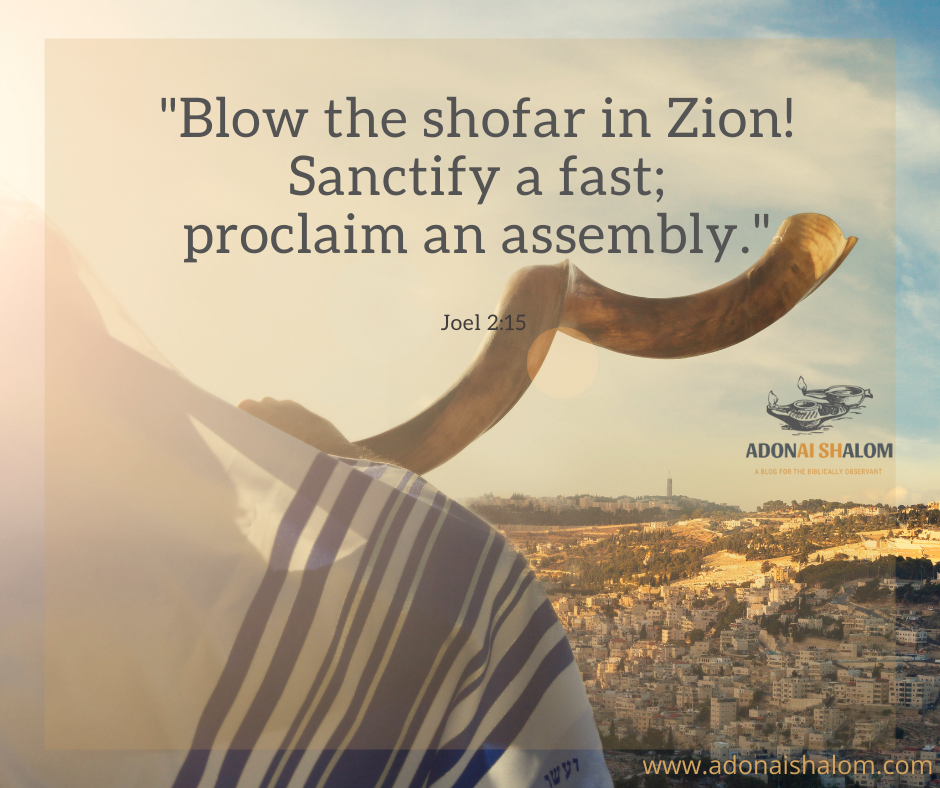
Yom Kippur is an amazing picture of what Messiah came to do
Messiah Yeshua (Jesus), God’s Son, came to earth to serve as the atoning sacrifice for our sins – once and for all.
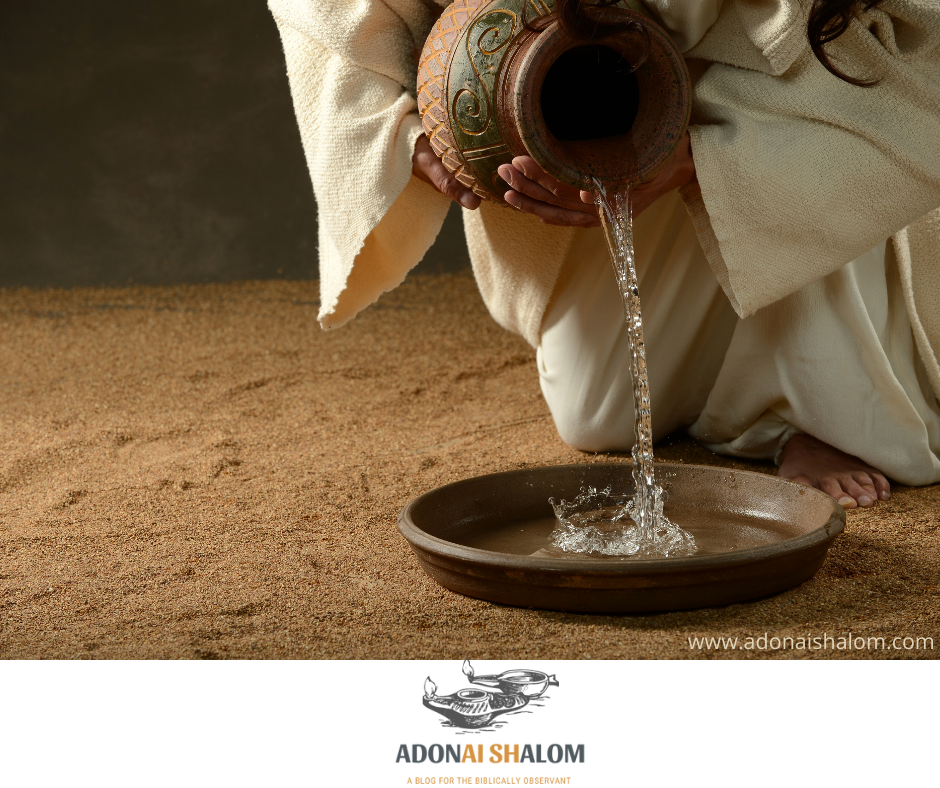
Now, instead of a yearly propitiation, forgiveness became available to all who would put their trust in Him and follow His Way.
Interestingly enough, the observance of Yom Kippur changed quite drastically after Messiah’s resurrection and the prophesied destruction of the Temple in 70AD. Now, the day no longer centers on animal sacrifices.
Isn’t it intriguing that today’s not-yet-believing Jews have to wrestle with this reality?
Many who refuse to accept that Yeshua (Jesus) is indeed the Messiah have to accept that the sacrificial element of Yom Kippur was interrupted.
Rather than accept substitutionary atonement, there are new, man-made “substitutions.”
Today, in the place of the now-absent Yom Kippur sacrifice, there is a great emphasis throughout the Jewish High Holy Days on teshuvah (repentance) and liturgical prayer or davening.
While there is certainly nothing wrong with intentional reflective times and repentance, and nothing wrong with praying and seeking God, the point of the Atonement of Yeshua is what He has done, not what we can accomplish, because truly without Him we can accomplish no-thing.
The reality is, Messiah died in our place. To save us.
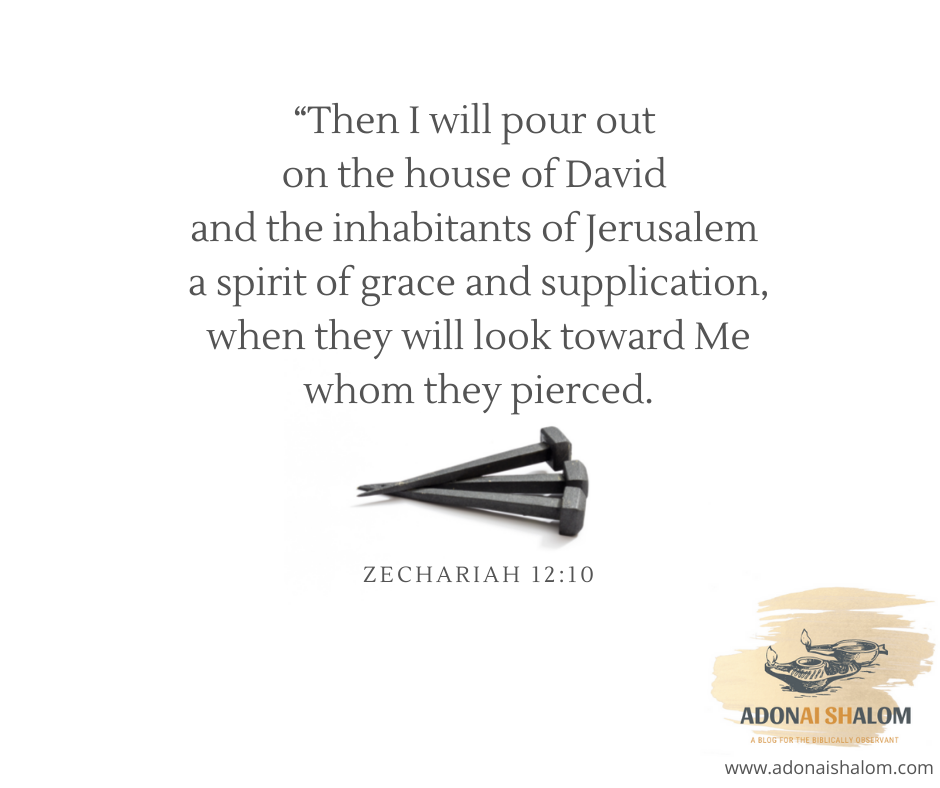
Should Christians fast on Yom Kippur?
I personally believe that followers of the Savior ought to fast in solidarity with the God’s chosen people of Israel.
It is my opinion that those of us who have experienced redemption and the ongoing, everlasting, merciful, abundant forgiveness of our loving Messiah ought to spend some extra time on Yom Kippur fasting and praying for those who are in Yom Kippur services and yet do not yet understand that their Messiah has already come and is coming back soon.
Fast and pray, not out of obligation, but out of love for Israel.
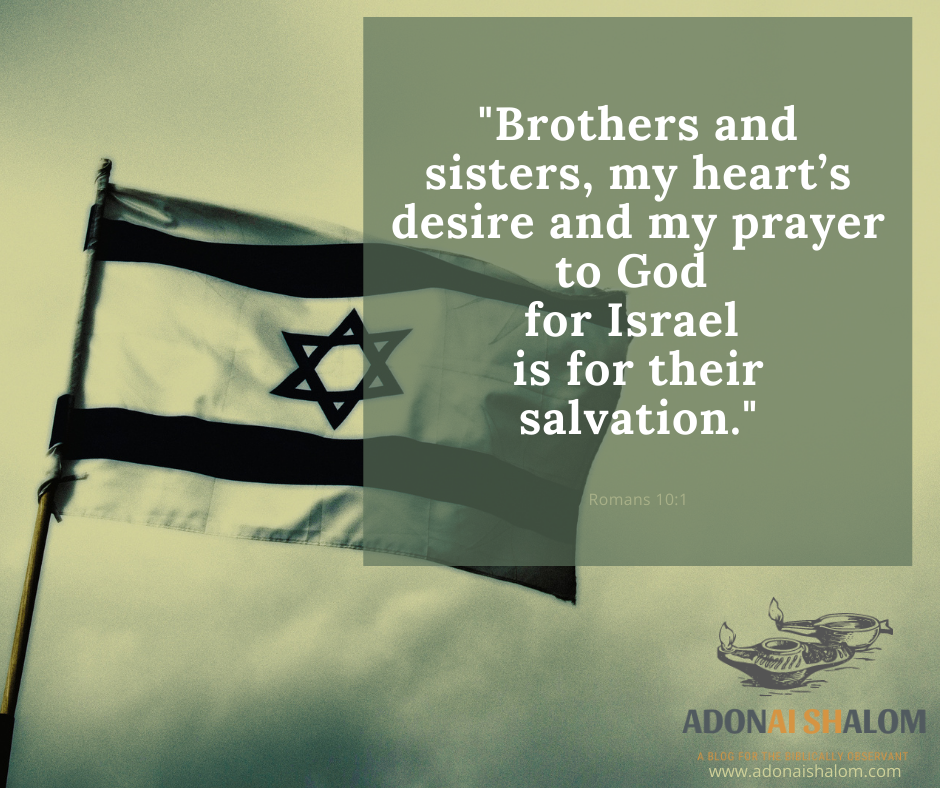
Yom Kippur and the Coming Reign of Messiah
There are many Messianic prophecies in the Bible, but what is found in Zechariah 12 in particular regarding mourning (i.e. genuine, travailing repentance) is very much related to Yom Kippur. We know that Messiah Yeshua will come back after the time of the tribulation and wicked nations will be about to attack Jerusalem.
ADONAI Tzva’ot will handle it: “It will happen in that day that I will seek to destroy all the nations that come against Jerusalem” (Zech.12:9).
It will be a troubling time and two out of three inhabitants of the land won’t survive all that occurs.
One third will remain, and will call upon the Name of the Lord, and He will answer them, as He always does.
Some of the text in Zechariah 12-14 can be complex, but the important detail that you must not overlook is the glorious fact that Yeshua Himself will save Jerusalem!
Zechariah 14:3-9
The vivid descriptions of the end of days in Matthew 24 and in other passages use imagery that relates to the Biblical feasts of Rosh Hashanah and Yom Kippur. A “Great Shofar” will sound, just like the Shofar HaGadol used for Yom Kippur services.
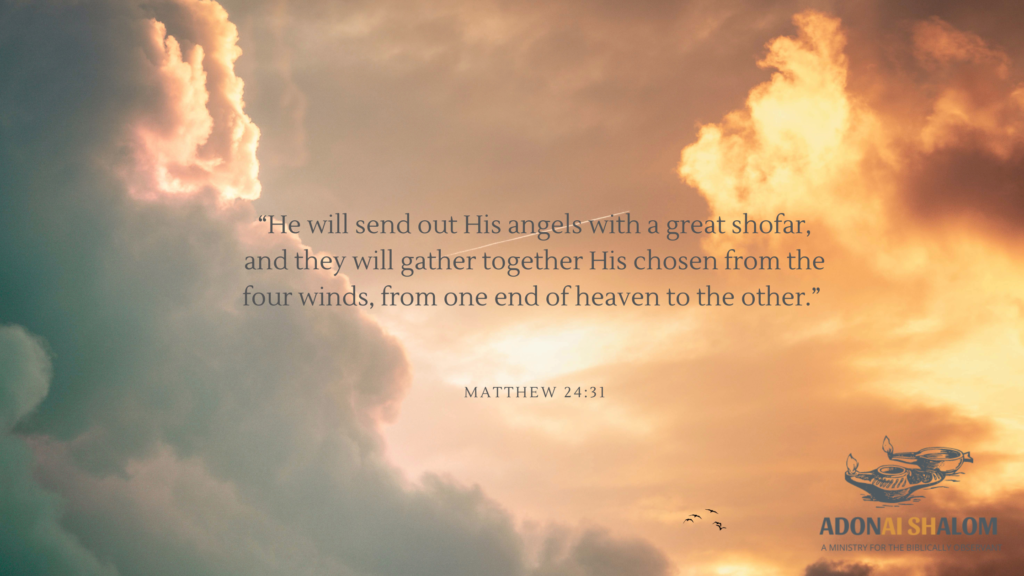
It will be the inauguration of Messiah Yeshua, ben Elohim, ben David, ben Adam ruling New Jerusalem as King as He reigns during the Messianic age! We gain a much richer depth of understanding when we realize that the feasts outlined in Scripture are intended to very clearly show us what is to come and give us great hope in which to anchor our faith. Much of the “future” spiritual reality is very much an already-present reality – so rest in Him and enjoy life in abundance!
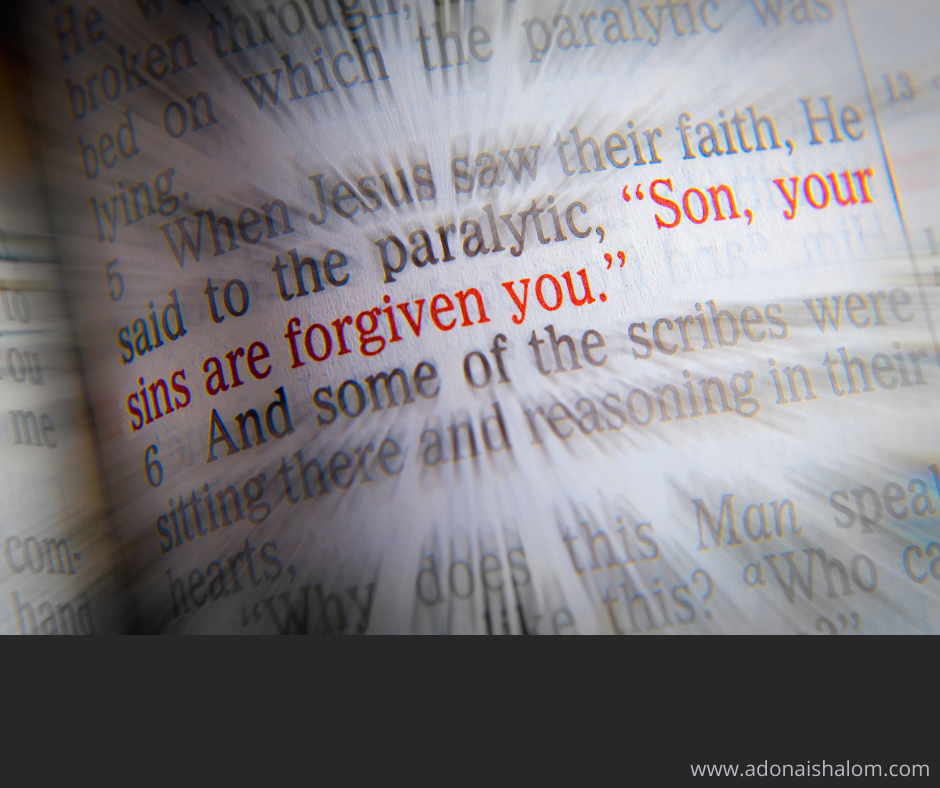
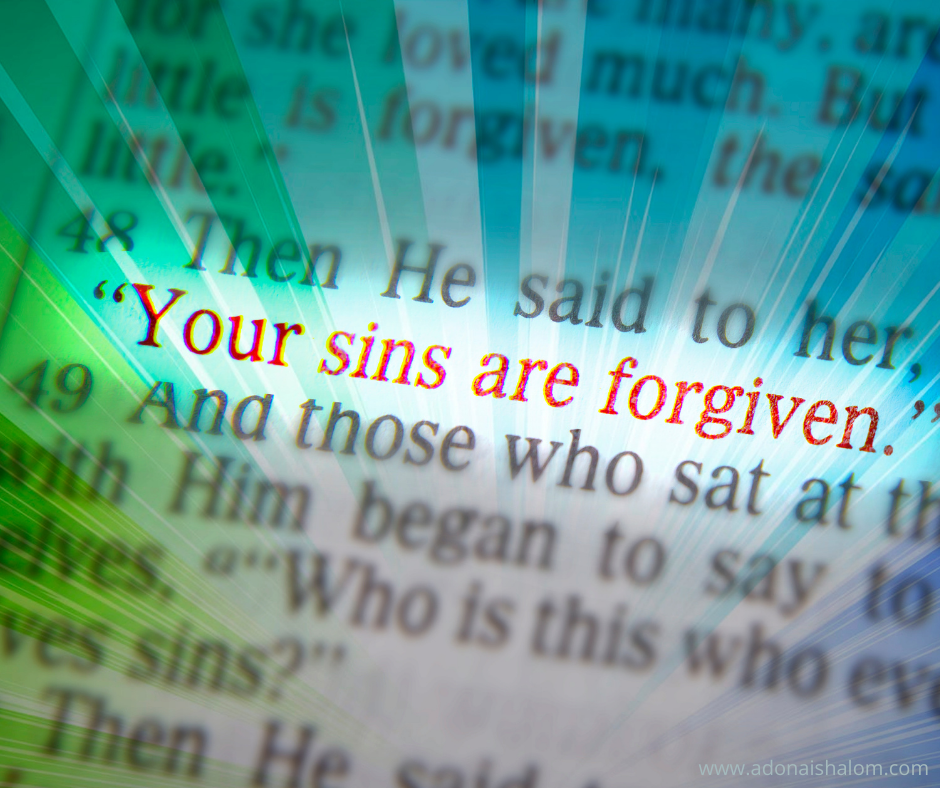
May you and your family enjoy the fall feasts together as we eagerly await the triumphant return of our Savior, Messiah Yeshua!
Do you have questions about the fall feasts? Leave a comment, and we will be happy to do our best to assist you! Shalom!
